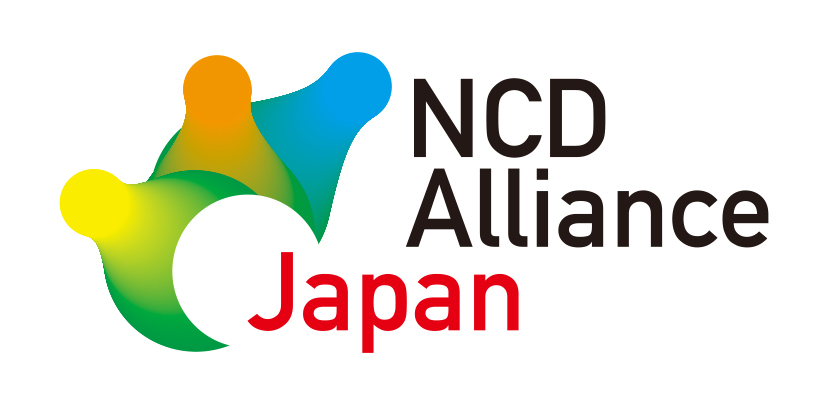Current Activities (October ― December 2023)
CONTENTS
- About Health and Global Policy Institute (HGPI)
- Top Global Health Policy Think Tanks 2020
- Non-Communicable Diseases (NCDs)
- Antimicrobial Resistance (AMR)
- Planetary Health
- Mental Health/Child Health
- Dementia Policy
- Special Breakfast Meeting
- Diet Member Briefing
- HGPI Seminar
- Health Policy Academy
- Lectures and Media Coverage
- Advocacy Activities to Encourage the Adoption of the Recommendations in Our Policy Proposals
- Providing Professional Expertise
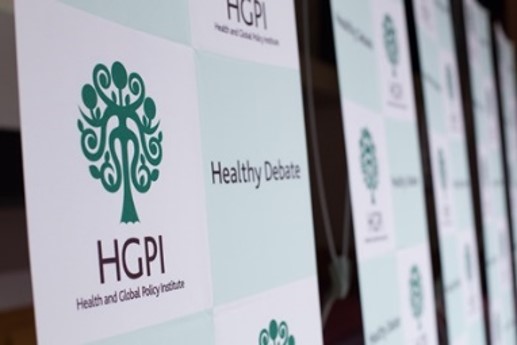
About Health and Global Policy Institute (HGPI)
Non-profit, Independent, and Global
Health and Global Policy Institute (HGPI) is a Tokyo-based independent and non-profit health policy think tank, established in 2004.
Since establishment, HGPI has pursued its mission of “Achieving citizen-centered health policies by bringing broad stakeholders together in its capacity as an independent think-tank to generate policy options for the public.” One of the Institute’s guiding principles in activities for this mission is to hold fast to its independence without adhering to the interests of any political party or organization. HGPI will continue to maintain political neutrality and independence from any organization in conducting its activities.
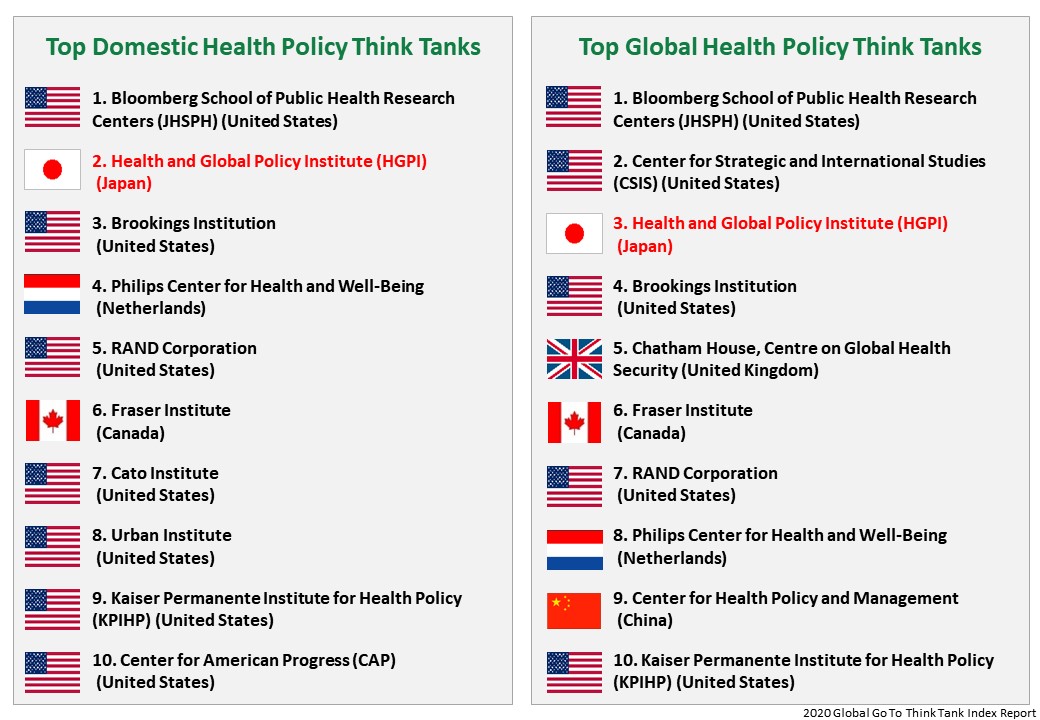
Top Global Health Policy Think Tanks 2020
Ranked Third in the World Among Global Health Policy Think Tanks
HGPI was ranked third among global health policy think tanks worldwide in University of Pennsylvania’s 2020 Global Go To Think Tank Index Report, published in January 2021. HGPI has been included in the ranking for twelve consecutive years, placing it among leading policy organizations.
“HGPI’s ranking is the result of its independence, the diversity of its funding sources, and its commitment to working globally by publishing all of its work in both English and Japanese. Encouraged by these results, we will double our efforts to continue to have a positive impact on society as a think tank specializing in health policy.” –HGPI Chairman Kiyoshi Kurokawa
“Especially during the pandemic, our work to advocate for citizens, patients, and healthcare workers is of the utmost importance. Now, more than ever, the world needs open and fair discussions on health policy. We will continue to foster such discussions, toward the creation of better policy ideas developed out of the combined knowledge of diverse stakeholders from the public and private sectors.” –HGPI CEO and Board Member Ryoji Noritake
NCDs: Non-Communicable Diseases
NCD Alliance Japan
NCD Alliance Japan is a collaborative platform for civil society organizations in the NCD community steered by the Health and Global Policy Institute. Its aim is to further promote comprehensive, cross-cutting NCD policies. Since 2013, NCD Alliance Japan has served as Japan’s point-of-contact for the NCD Alliance, which brings together over 2,000 civil society organizations and academic institutions in more than 170 countries. NCD Alliance Japan was officially recognized as a full member of the NCD Alliance in January 2019.
Patient and Public Involvement (PPI) Support Project
Advisory Board Meeting
Necessary Steps for Promoting PPI in Policy Making
HGPI has offered policy recommendations and taken a number of other activities to promote patient and public involvement (PPI) in policy development process, under our stated mission of “Achieving citizen-centered health policy.” Recently, initiatives for PPI in processes of health policy development are now being advanced at both the national Government and local level at councils. However, new issues have been recognized consequentlywhich include a lack of diversity and the number of individuals who desire to be involved. Based on our recognition of these issues, our PPI Support Project this year aims to promote the involvement of diverse patient and public representatives into policy development process.
Advisory Board Members (Titles omitted; in Japanese alphabetical order by last name, absent members included)
Kyoko Ama (Representative, Children and Healthcare Project; Fellow, HGPI)
Shinsuke Amano (Chair, The Japan Federation of Cancer Patient Groups; CEO, Group Nexus Japan)
Etsuko Aruga (Professor, Department of Palliative Medicine, Teikyo University School of Medicine)
Naomi Sakurai (President, Cancer Solutions Co., Ltd)
Takeshi Shukunobe (President and CEO, PPeCC)
Kazuyuki Suzuki (Senior Lead, Patient Engagement Group, Strategy & Execution, Novartis Pharma K.K.)
Yasuhiro Sensho (CEO, SENSHO-GUMI, Co., Ltd.; Former Director-General, MHLW)
Teppei Maeda (Lawyer, Maeda & Unosawa Law Offices; Representative, Medical Basic Act Community)
Kaori Muto (Professor, Department of Public Policy Studies, Institute of Medical Science, University of Tokyo)
Akira Morita (Representative Director, Next Generation Fundamental Policy Research Institute (NFI))
Ikuko Yamaguchi (Chief Director, Consumer Organization for Medicine and Law (COML))
Risa Yamazaki (Public Affairs Group, External Affairs Department, Chugai Pharmaceutical Co., LTD.)
2023.10.03
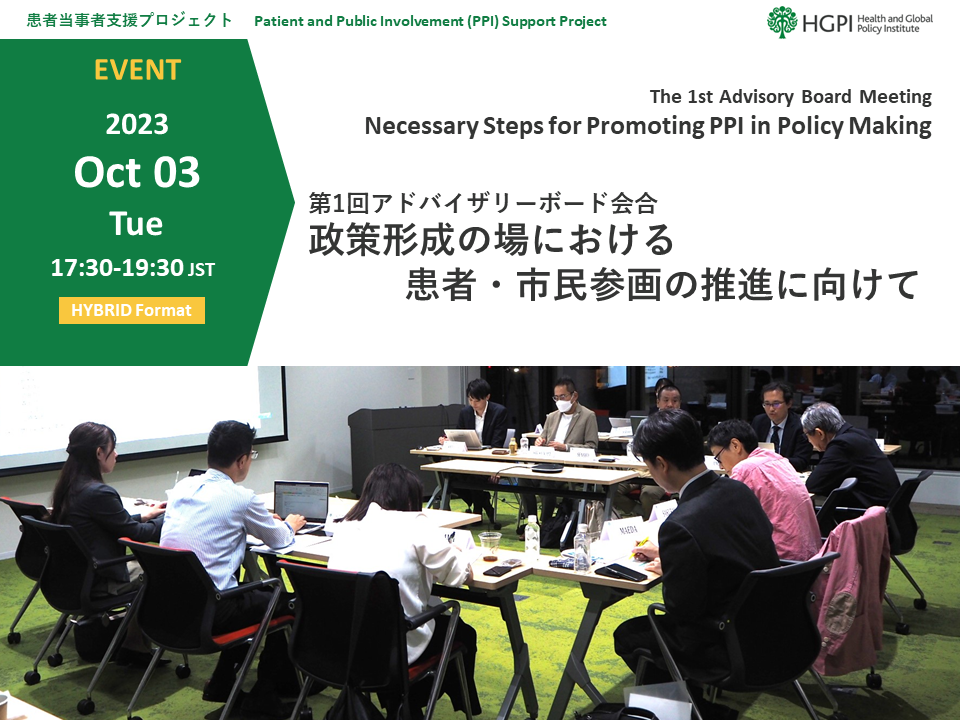
The 1st Advisory Board Meeting
Advisory board members from industries, government officials, academia and civil society discussed the purpose and meaningfulness of PPI in policy development the roles that are required of patient and public representatives in governmental discussion committees.
2023.12.08
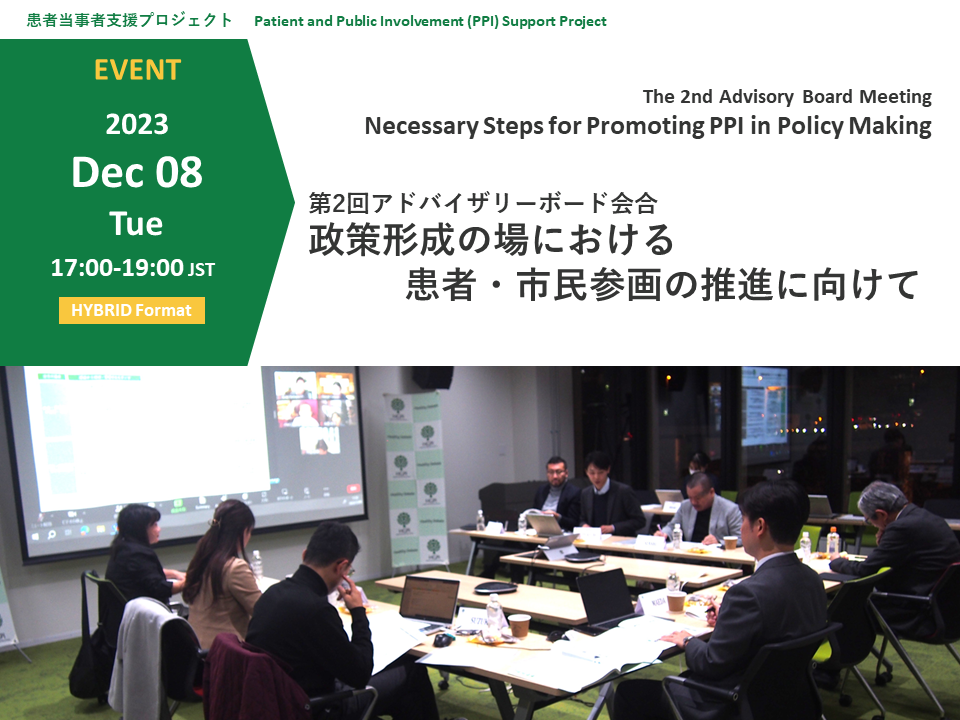
The 2nd Advisory Board Meeting
Advisory board members design of policy making process that reflects the voices of diverse patients and citizens and measures to secure human resources for patient and citizen engagement.
Obesity Control Promotion Project
Advisory Board Meeting
The Next Steps for Engaging and Cooperating with Patients, Citizens, and Communities for Implements of Obesity Control Measurements
The second phase of “ the Project , fiscal 2023, aims to establish a system where individuals with obesity can promptly receive appropriate medical care and implement specific measures to promote and enhance this system. The focus is on identifying realistic and sustainable obesity policies that should be promoted and implemented at the national and local government levels, and conducting advocacy activities.
Advisory board members (titles omitted; in Japanese syllabary order)
Tomonori Okamura (Professor, School of Medicine Department of Preventive Medicine and Public Health, Keio University)
Yuko Oguma (Associate Professor, Sports Medicine Research Center, Graduate School of Health Management, Keio University)
Tetsuya Kakuma (Professor, Faculty of Medicine Department of Nursing Fundamental Nursing Sciences Health Sciences, Oita University)
Iwao Kurose (Executive Director, Japan Medical Association)
Atsuhito Saiki (Director, Diabetology, Endocrinology and Metabolism, Toho University Sakura Medical Center)
Takeshi (George) Imaoka (Associate vice President, Medical, Diabetes Products and Clinical Pharmacology Medical, Japan Drug Development and Medical Affairs, Eli Lilly Japan K.K)
Tomotaka Shingaki (Sr.Advisor-Medical, Diabetes products and clinical Pharmacology Medical, Japan Drug Development and Medical Affairs)
Hiroshi Sugii (Vice chair/ Member of the board, AVP CMRQ Development Region Japan, CMRQ Development Division, Novo Nordisk Pharma Ltb.)
Ichiro Tatsuno (Chairman, Japanese Society for Treatment of Obesity/ President, Chiba Prefectural University of Health Sciences)
Sayaka Tsuji (Bariatric Treatment Coordinator, Toho University Sakura Medical Center)
Koutaro Yokote (President, Japan Society for the Study of Obesity/ Director General, Chiba University Hospital)
Observer (titles omitted; in Japanese syllabary order)
Kazutaka Tanabe (Director, Women’s Health Promotion Office, Health Service Division, Health Service Bureau, Ministry of Health, Labour and Welfare)
Yasuhiro Nishijima (Director, Cancer and Disease Control Division, Health Service Bureau, Ministry of Health, Labour and welfare)
2023.10.05, 2023.11.17
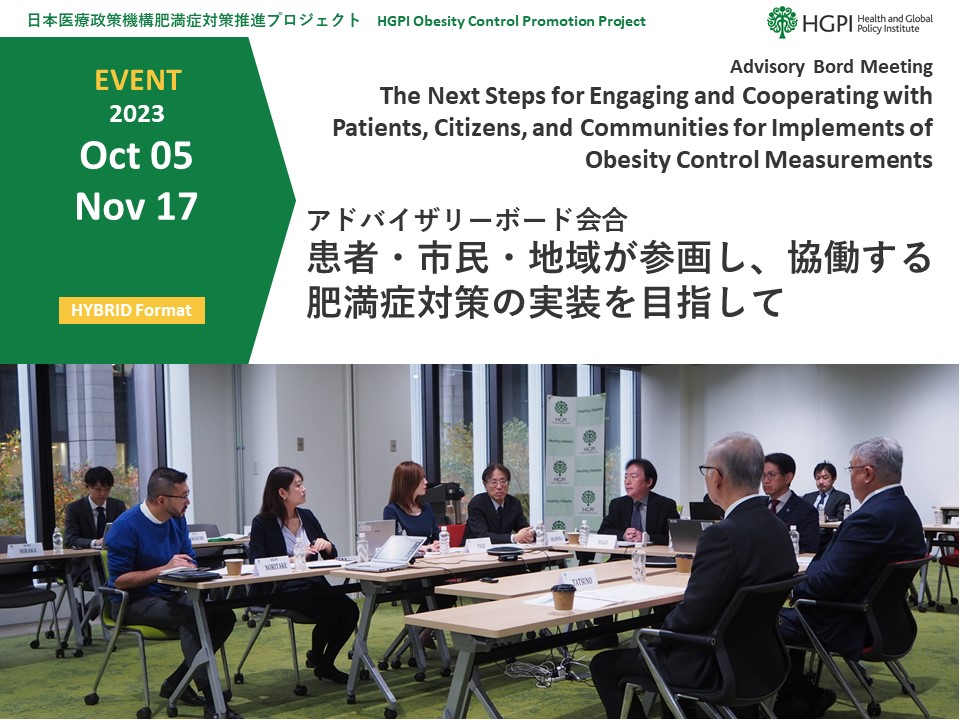
The 1st Advisory Board Meeting, The 2nd Advisory Board Meeting
Incorporating the patient journeys of individuals with obesity and the experiences of clinical settings. The focus was on how medical care and connections to healthcare should be established for obesity, and a multi-stakeholder dialogue took place regarding the structure of healthcare delivery systems.
2023.12.15
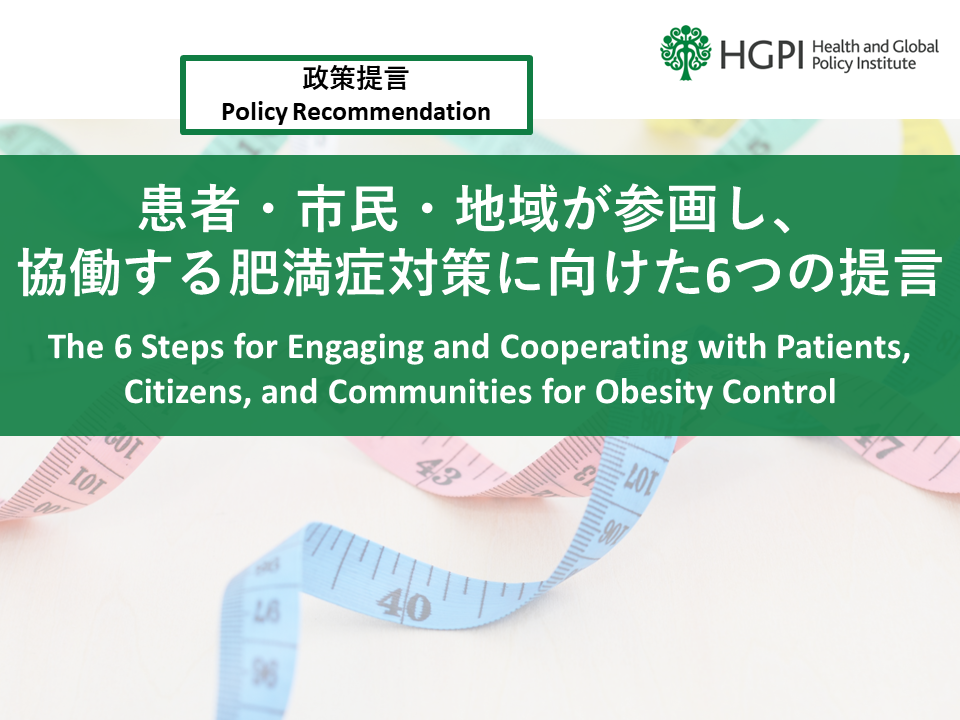
Recommendations
The 6 Steps for Engaging and Cooperating with Patients, Citizens, and Communities for Obesity Control
These recommendations are based on findings from the Global Expert Meeting “The Next Steps for Engaging and Cooperating with Patients, Citizens, and Communities for Obesity Control.” hold on March 31, 2023.
- Recommendation 1: The definition of obesity that requires medical intervention must be broadly disseminated throughout society, people living with obesity of the type that necessitates medical intervention must be identified, and ongoing efforts to establish all types of relevant guidelines based on scientific evidence must continue.
- Recommendation 2: When treating cases of obesity that require medical intervention, in addition to involving physicians and healthcare institutions specializing in obesity, it will also be necessary to promote multidisciplinary cooperation and collaboration with family doctors and occupational physicians.
- Recommendation 3: The causative factors of obesity are diverse and complex. Rather than limiting ourselves to the concept of personal responsibility and only viewing obesity as the result of overeating and physical inactivity, we must reaffirm the issues that create factors for obesity for the parties most affected and in society as a whole with a perspective that encompasses the Social Determinants of Health (SDH).
- Recommendation 4: Based on the diversity and complexity of the causative factors of obesity, collaboration with and involvement from broad stakeholders must be expanded so a greater variety of obesity interventions can be provided.
- Recommendation 5: The prevalence of general obesity and obesity requiring medical intervention vary among countries and regions, so research in Japan must be enhanced and evidence- and data-based policies must be expanded.
- Recommendation 6: Health promotion measures that affected parties consider harmonious, must be promoted by building health information networks and health data systems that encompass obesity control and the entire health system.
Kidney Disease – Obesity – Cardiovascular Disease
2023.12.07
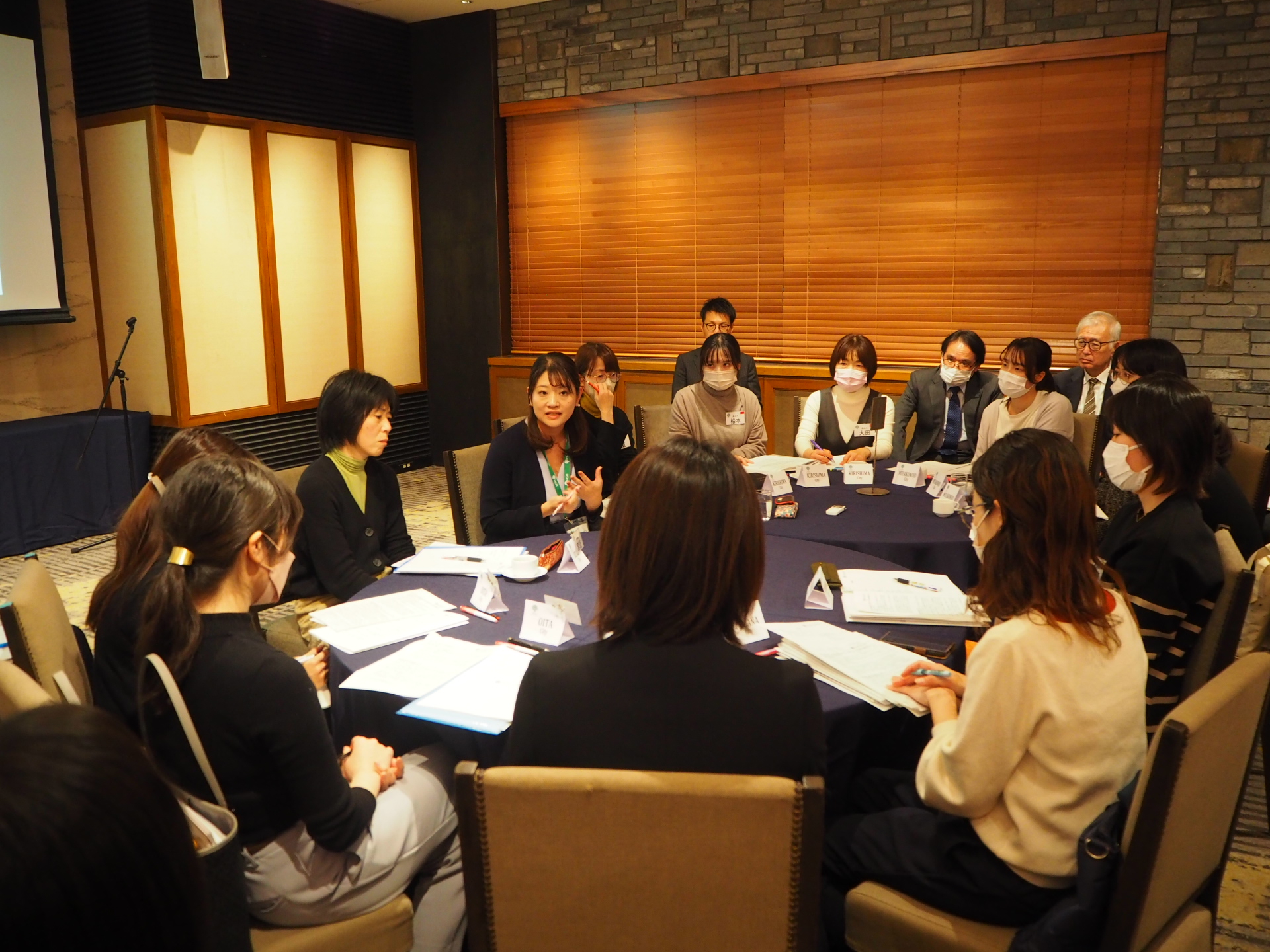
NCDs-related Cross-project Meeting
The 1st NCDs Meeting in Kyushu
The “1st NCDs Meeting in Kyushu” was jointly held by the Kidney Disease Control Promotion Project, the Obesity Control Promotion Project, and the Cardiovascular Disease Control Promotion Project of HGPI. This meeting was held to deepen the understanding of chronic and non-communicable diseases (NCDs), which require intervention and management across the board in communities and workplaces. The meeting also discussed how NCDs measures should be tailored to local conditions and characteristics, as well as to promote the horizontal development of policies. The purpose of the event was to build a network among local governments in order to promote policy development.
Discussion Points of the Group Discussion
- Issue 1: What are more effective methods and approaches to recommend health checkups to the target population, given the limitations of the current administrative recommendation for health checkups?
- Issue 2: What should be the role of prefectures, municipalities, and public health centers, and how should cross-disease collaboration within each municipality be organized?
- Issue 3: How can obesity, which is expected to be newly addressed, be integrated into regional measures against cardiovascular disease, kidney disease, and diabetes?
The Project for Considering the Future of Precision Medicine with Industry, Government, Academia, and Civil Society
“Precision cancer medicine,” in which treatment is tailored to each individual according to cancer characteristics such as genetic mutations, is expected to play an important role in the future. However, “Precision cancer medicine” is currently limited in the number of medical indications, (a) the number of medical indications for its use is still quite limited; (b) it involves the use of genetic information; and (c) the costs of testing and treatment are often expensive. Due to these characteristics, various issues have arisen in developing personalized cancer care throughout Japan without bias.
HGPI launched the “Project for Considering the Future of Precision Medicine with Industry, Government, Academia, and Civil Society” in the summer of 2021, and generates policy advocacy for future cancer control.
2023.10.11
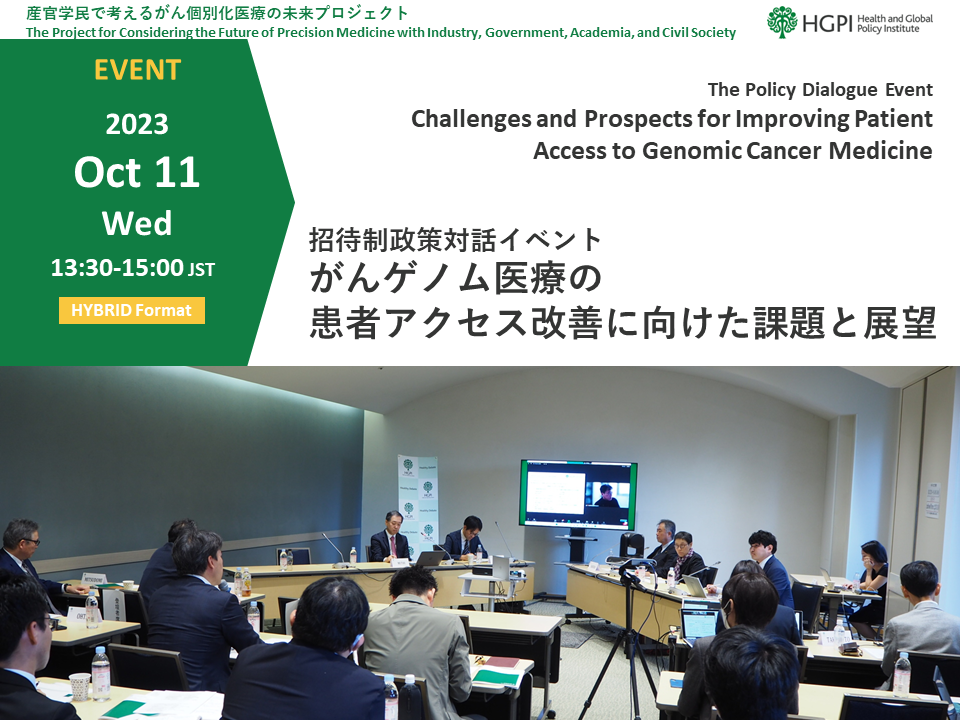
The Policy Dialogue Event
Challenges and Prospects for the Improving Patient Access to Genomic Cancer Medicine
HGPI held Policy Dialogue Event on October 11, 2023 to deepen discussions based on Policy Recommendations “Improving Patient Access to Genomic Cancer Medicine policy proposal” (August 10, 2023) and to serve as a bridge for implementation into society.
2023.12.15
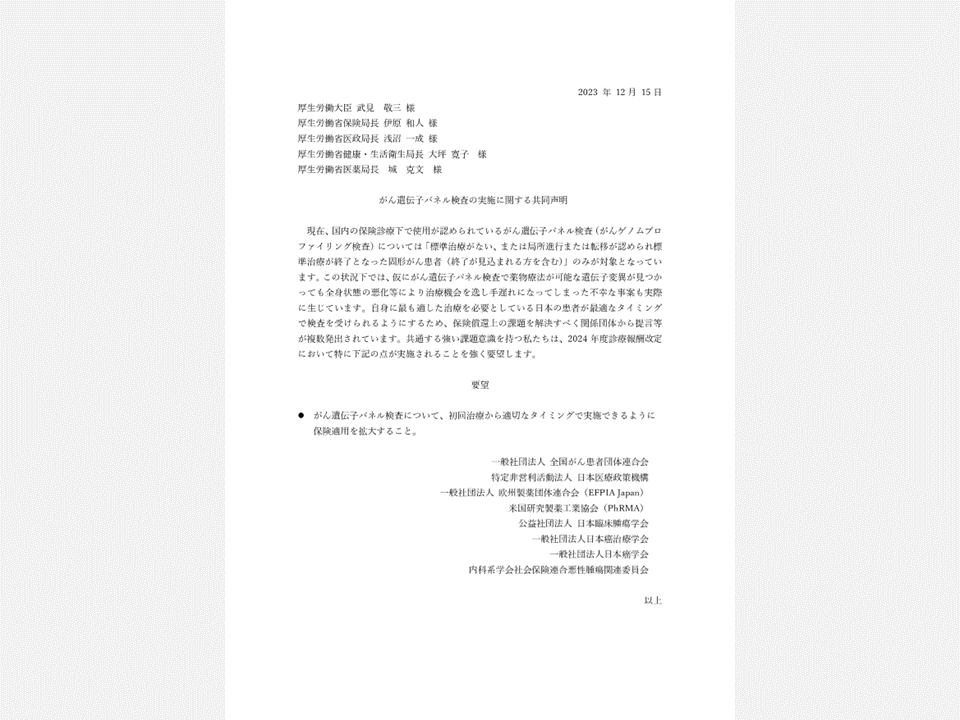
Joint Statement
Joint Statement on the Implementation of Comprehensive Genomic Profiling test
In addition to our Organization, this Joint Statement is endorsed by the Japan Federation of Cancer Patient Groups, the European Federation of Pharmaceutical Industries and Associations (EFPIA Japan), the Pharmaceutical Research and Manufacturers of America (PhRMA), the Japanese Society of Medical Oncology, the Japanese Society of Clinical Oncology, the Japanese Cancer Association, and the Social Insurance Union of Societies Related to Internal Medicine.
Request
Expand insurance coverage for cancer gene panel testing so that it can be done at the appropriate time from the time of initial treatment.
Chronic Pain Measures Project
With estimates showing that 1 in 5 lives with chronic pain and loss of productivity brings huge impacts on society in Japan. Chronic pain is complex conditions and ones that is difficult to treat, it is highly evident that multi-disciplinary treatment and care is needed. With these circumstances in mind, in FY2022, HGPI compiled a policy recommendation entitled “Achieving Equity in Multidisciplinary Pain Treatment and Support Systems for Pain Management“ based on hearings with patient advocacy organizations, healthcare providers, representatives of academia in the field of chronic pain, and other stakeholders.
2023.11.16
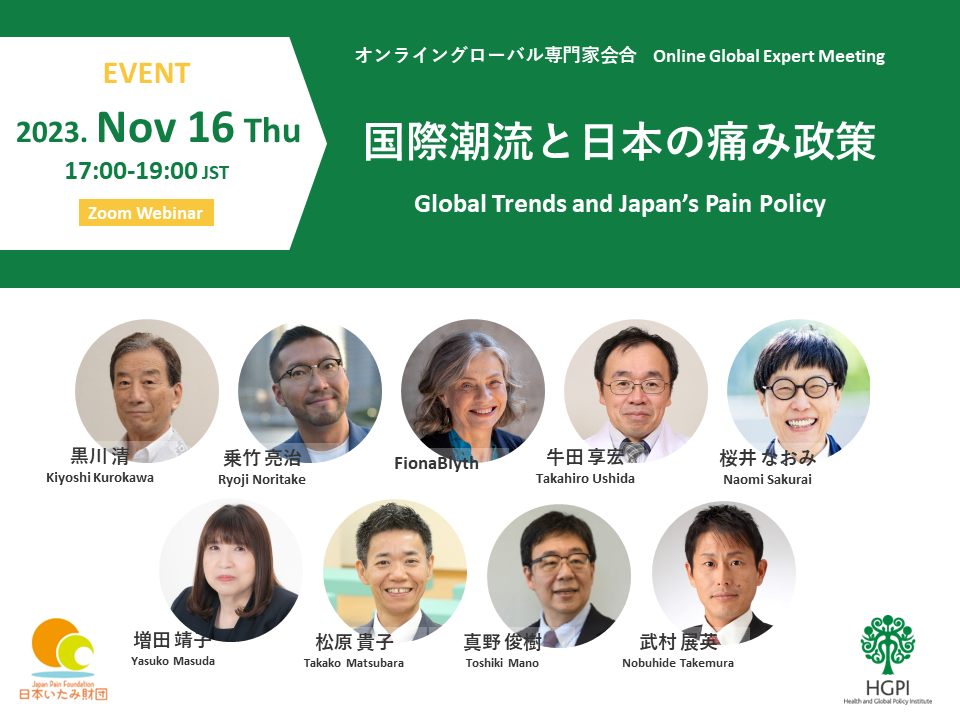
Online Global Expert Meeting
Global Trends and Japan’s Pain Policy
This expert meeting focused on a policy framework needed to integrate a wide range of interventions for pain policy.
Participants (titles omitted)
Takahiro Ushida (Professor, Department of Pain Medicine; Director, Institute of Physical Fitness, Sports Medicine and Rehabilitation, Aichi Medical University)
Fiona Blyth (Professor of Public Health and Pain Medicine, Sydney School of Public Health, Faculty of Medicine and Health, University of Sydney)
Toshiki Mano (Professor, Chuo Graduate School of Strategic Management, Chuo University)
Takako Matsubara (Professor, Graduate School of Rehabilitation, Kobe Gakuin University)
Yasuko Masuda (National Patient and Family Group for Spinal Ligament Ossification)
Naomi Sakurai (President, Cancer Solutions Co., Ltd)
Nobuhide Takemura (Member, House of Representatives; State Minister of Agriculture, Forestry and Fisheries; Director, Parliamentary Group for Chronic Pain)
AMR: Antimicrobial Resistance
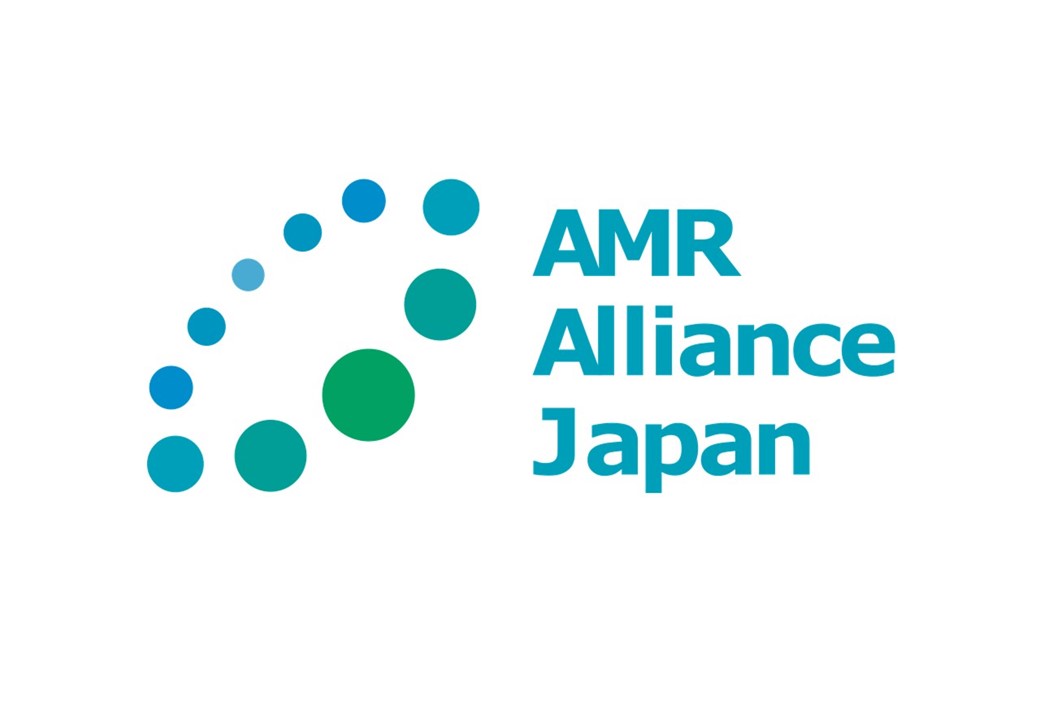
AMR Alliance Japan
Established in November 2018 by academic societies working in infectious disease medicine, pharmaceutical companies, and medical device makers, AMR Alliance Japan is an independent platform for the promotion of multisector discussion on AMR countermeasures. The Alliance develops and disseminates policy recommendations to: (1) ensure that AMR countermeasures are in line with the current situation of patients and healthcare settings; (2) promote the national and international AMR agenda; and (3) advance Japan’s AMR policy.
2023.10.17
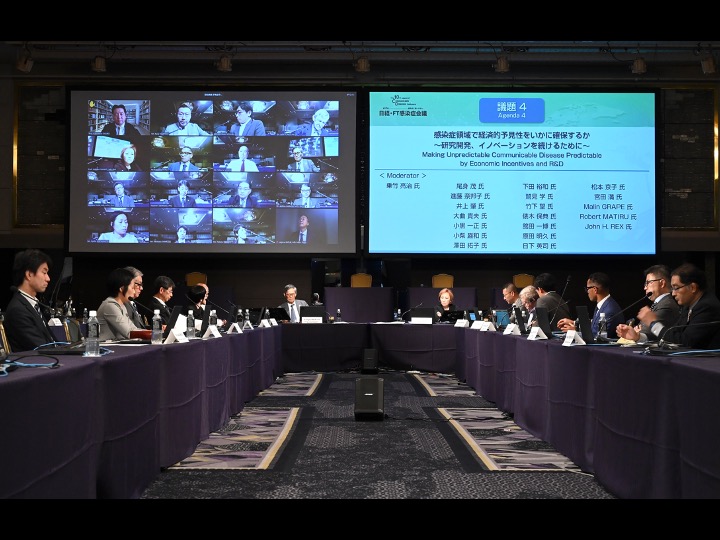
The 10th Nikkei FT Communicable Diseases Conference – The AMR Consortium of the Asia Africa Medical Innovation Consortium (AMIC)
Making Unpredictable Communicable Disease Predictable by Economic Incentives and R&D
Discussions were held on the progress of AMR measures to date, reflecting on the achievements of the AMR Consortium’s activities. The focus was on the future direction of sustainable research and development in the field of infectious diseases, including economic predictability. In the formulation of statements, input was provided by the AMR Consortium on the evaluation and improvement of the pull-type incentive system, and the establishment of a drug discovery ecosystem that contributes to infection control measures.
2023.10.31

Roundtable on Drastic Reform of Testing and Diagnostic Stewardship Systems as Part of Countermeasures for Antimicrobial Resistance (AMR)
To establish a rapid testing and diagnostic system as part of AMR, this roundtable meeting brought together domestic and international opinion leaders who shared their unique perspectives on and discuss establishing a testing system that contributed to AMR control with a medium- to long-term outlook that surpasses revisions to the medical service fee schedule.
Planetary Health
2023.10.03
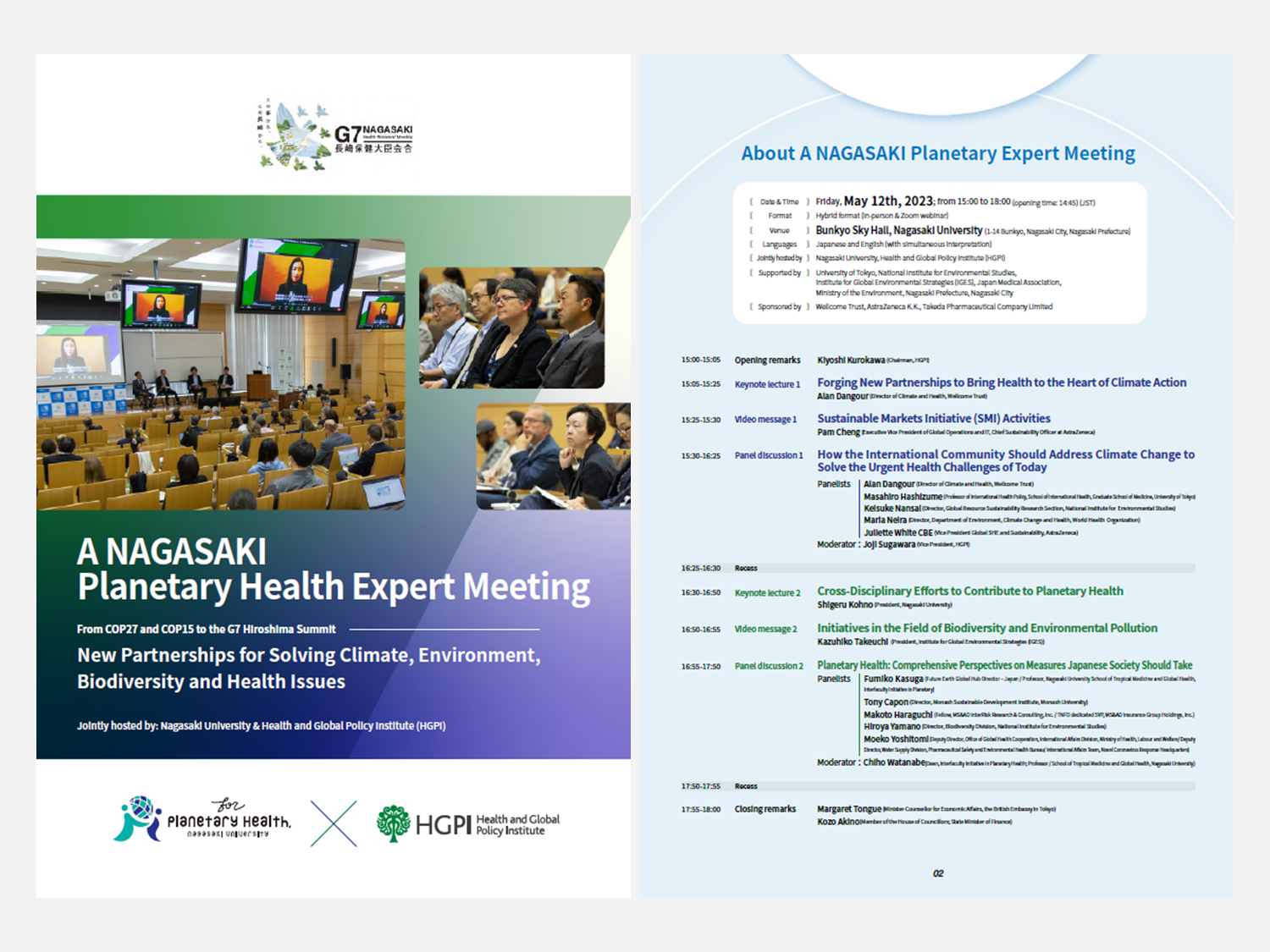
A NAGASAKI Planetary Health Expert Meeting Report Publish
From COP27 and COP15 to the G7 Hiroshima Summit: New Partnerships for Solving Climate, Environment, Biodiversity and Health Issues
A new “UHC Political Declaration” was adopted at the High-Level Meeting on Universal Health Coverage (UHC) on September 21, 2023, which also addressed planetary health issues. Based on the report, we hope that efforts will be further deepened by domestic and international stakeholders.
 The Third Advisory Board Meeting in FY2023
The Third Advisory Board Meeting in FY2023
Planetary Health: Necessary Steps for a Sustainable Environment
Aiming to advance discussions on planetary health and to contribute to better health for the Earth and its people, HGPI formed an advisory board and launched its Planetary Health Project in FY2022. Together with our newest advisory board members who joined in FY2023, opinion leaders and relevant parties in the field of planetary health from industry, government, academia, and civil society will share best practices and ideas from each stakeholder group, identify issues, and recommend solutions.
Advisory board members (titles omitted; in Japanese syllabary order)
Satoru Arima (DAIICHI SANKYO HEALTHCARE CO., LTD.)
Saori Kashima (Director, Center for the Planetary Health and Innovation Science (PHIS), Associate Professor of Environmental Health Sciences Laboratory, Graduate School of Advanced Science and Engineering, Hiroshima University)
Masahiro Kaminota (Director-General, Environmental Health Department, Minister’s Secretariat, Ministry of the Environment)
Taiko Kudo (Chief Engineer, Environment and Energy Division, Japan Weather Association)
Naoki Kondo (Professor and Chair, Department of Social Epidemiology, Graduate School of Medicine and School of Public Health, Kyoto University)
So Sugawara (Representative Director, Green innovation)
Yasuhiko Suzuki (Director, International Joint Research Institute for Zoonosis Control, Hokkaido University; Distinguished Professor, Hokkaido University)
Yukari Nakano (Executive Officer, Japanese Nursing Association)
Keiko Nakamura (Professor, Department of Global Health Entrepreneurship, Graduate School of Medical and Dental Sciences (Medicine), Tokyo Medical and Dental University)
Keisuke Nansai (Head, Material Cycles Division of National Institute for Environmental Studies (NIES))
Masahiro Hashizume (Professor, Department of Global Health Policy, Graduate School of Medicine, The University of Tokyo)
Makoto Haraguchi (Fellow, MS&AD InterRisk Research & Consulting, Inc. / TNFD dedicated SVP, MS&AD Insurance Group Holdings, Inc.)
Eiji Hinoshita (Assistant Minister for Global Health and Welfare, Ministry of Health, Labour and Welfare)
Kenji Fuma (Specially Appointed Professor, Co-Creative Organization for Green Society, Shinshu University / CEO, Neural, Inc.)
Hidekazu Hosokawa (Executive Director, Japan Medical Association)
Yusuke Matsuo (Director, Business Task Force, Institute for Global Environmental Strategies)
Yutaka Mitsutake (Director, Japan Sustainability, AstraZeneca K.K.)
Ryohei Yamagata (Sustainability Manager, Medical Policy and External Affairs Division, Novo Nordisk Pharma K.K.)
Hiroya Yamano (Director, Biodiversity Division, National Institute for Environmental Studies)
Naoko Yamamoto (Professor, International University of Health and Welfare / Director, Global Medical Cooperation Center)
Chiho Watanabe (Dean, Interfaculty Initiative in Planetary Health; Professor, School of Tropical Medicine and Global Health, Nagasaki University)
Japan Association for Global Health, Students Section (jagh-s)
Asian Medical Students’ Association Japan (AMSA Japan)
2023.10.30
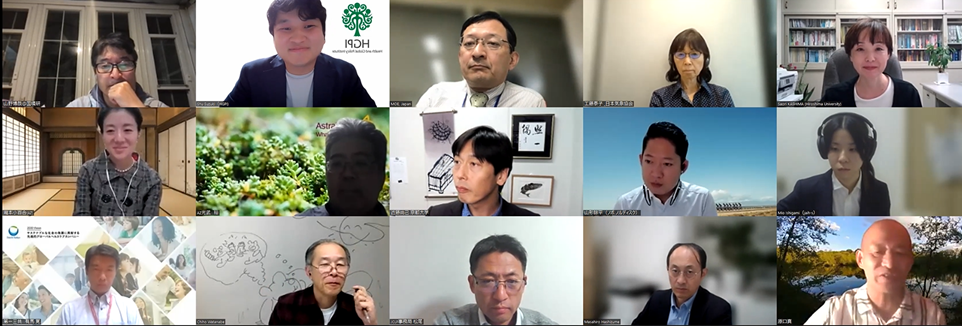
The Third Advisory Board Meeting in FY2023
Challenges facing Japan include frequent natural disasters and a demographic transition resulting from birthrate decline and population aging. Deepening discussions and implementing future solutions will require multi-stakeholder efforts to identify unique challenges facing Japan and to build understanding toward them. At the third meeting in 2023, three members provided agenda items regarding their awareness of issues and initiatives.
2023.11.02
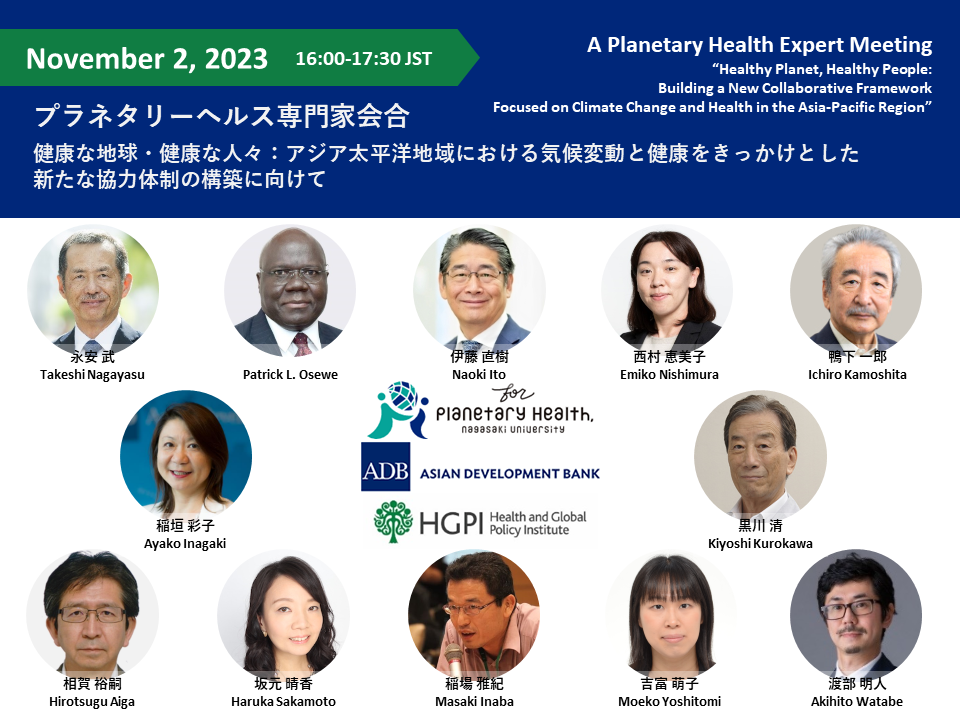
Planetary Health Expert Meeting
Healthy Planet, Healthy People: Building a New Collaborative Framework Focused on Climate Change and Health in the Asia-Pacific Region
Advisory board members reaffirmed the role played by the Japanese Government at the G7 Hiroshima Summit and the UN General Assembly and discussed the roles and challenges that Japan should play in promoting close cooperation with diverse stakeholders and building sustainable and resilient health systems in the Asia-Pacific region in the future.
2023.11.29
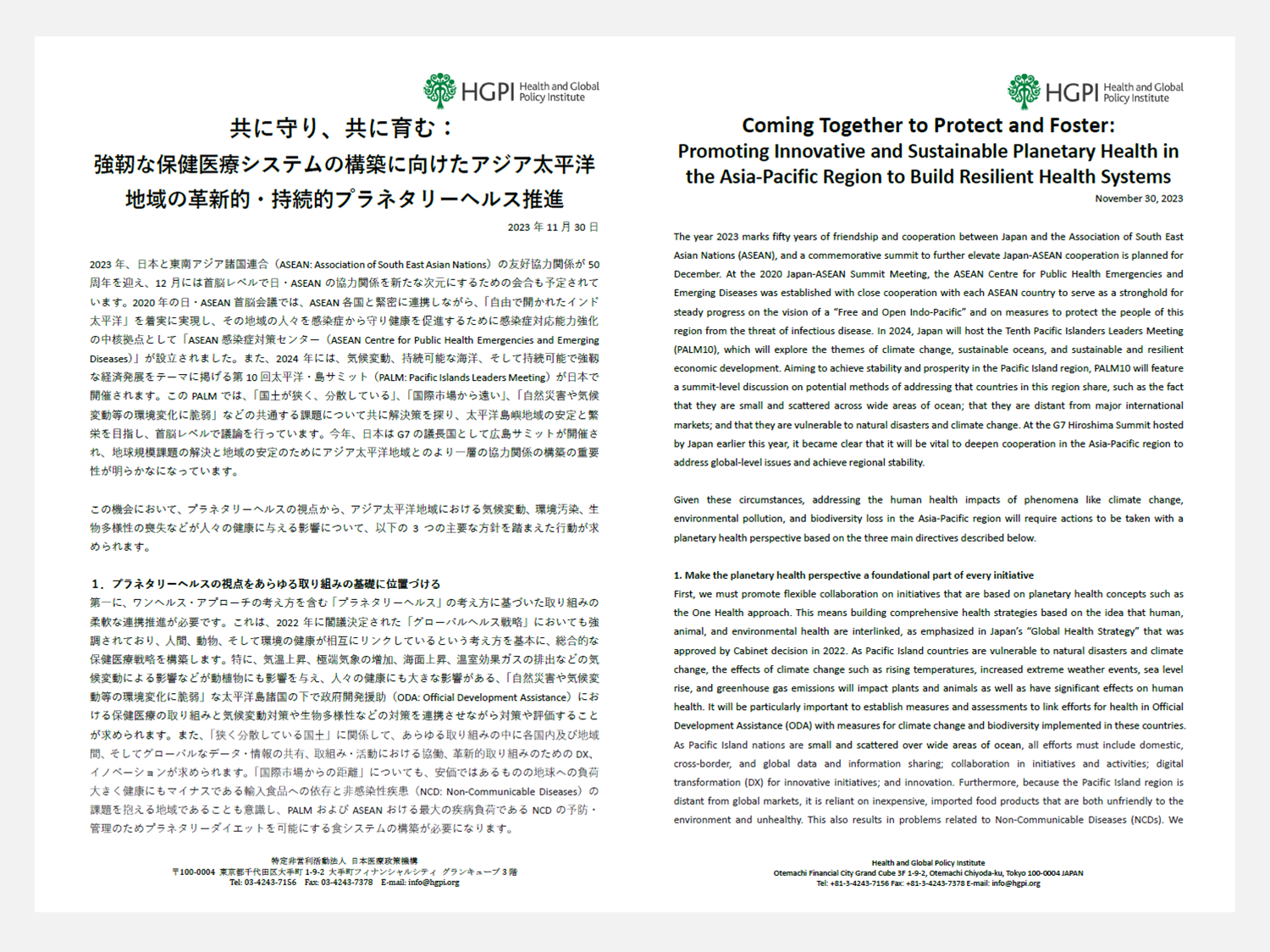
Policy Recommendations
Coming Together to Protect and Foster: Promoting Innovative and Sustainable Planetary Health in the Asia-Pacific Region to Build Resilient Health Systems
Addressing the human health impacts of phenomena like climate change, environmental pollution, and biodiversity loss in the Asia-Pacific region will require actions with a planetary health perspective based on the three main directives described below.
- Make the planetary health perspective a foundational part of every initiative
- Build health systems that are based on a planetary health perspective
- Promote collaboration that is based on a planetary health perspective
2023.12.03
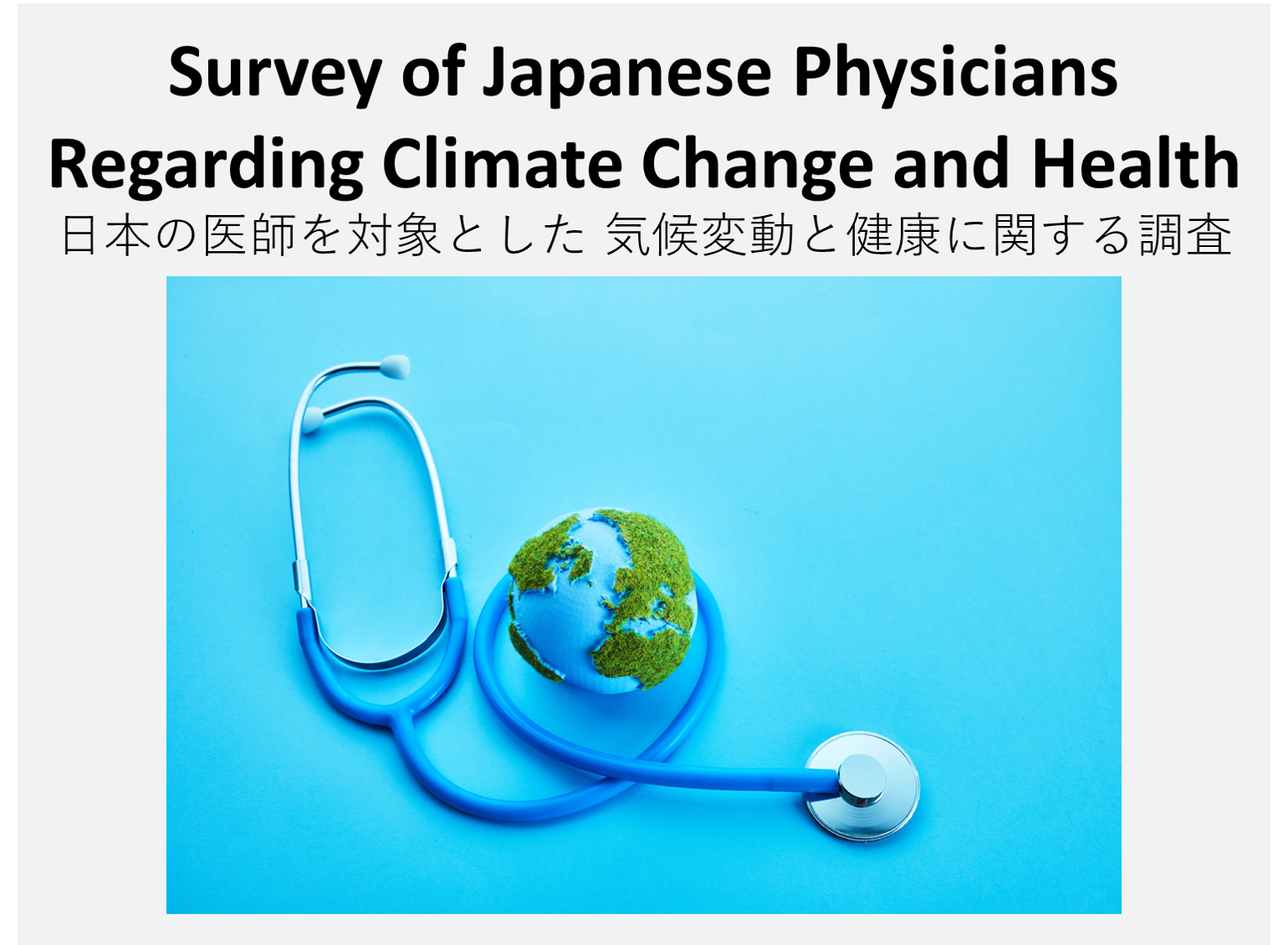
Research Report
Survey of Japanese Physicians Regarding Climate Change and Health
Ahead of the 28th Conference of the Parties (COP28) to the United Nations Framework Convention on Climate Change (UNFCCC), HGPI and the SPRING GX project of the University of Tokyo conducted a survey among Japanese physicians to gather their opinions regarding climate change and health, sustainable healthcare systems, and climate change policy.
Key Findings
- Physicians do not have sufficient knowledge about climate change (36.1% got more than half of the question correct), the term “planetary health” is not widely recognized (18.2%)
- Many physicians believe that climate change is affecting the health of the Japanese population and more specifically recognizing the impact on the health of the patients they see in their clinic
- 78.1% of physicians believe that climate change is affecting the health of people in Japan
- 51.5% of physicians believe that climate change is impacting the health of patients in their field of practice
- Around 70% of physicians are also aware of the health impacts caused by climate change and believe that over the next 10 years climate change will significantly adversely affect the following health issues
- Physical harm and/or injury from extreme weather events (e.g., flooding, typhoons, landslides, wildfires) (83.3%)
- Heat-related illness (79.5%)
- Arthropod-borne infections (75.8%)
- There is limited access to education on climate change and health
- Received education on “climate change and health” or “planetary health” while in medical school (6.5%)
- Received specialized training on climate change and health (11.6%)
- More than 70% of the physicians would like to choose products, equipment, etc. that have lower environmental impacts and are more sustainable options, if available
- More than half of the physicians agree that they should educate and advocate to their patients and their institution/facility
- Physicians should advise their patients on the links climate change has on their health (56.7%)
- Physicians should advocate within their institution/facility for implementing mitigation measures for more environmentally sustainable healthcare (57.5%)
- More than half of the physicians reported that the main barriers that prevent them from taking more action include lack of information and resources (54.4%), lack of knowledge (52.7%), and lack of time (51.7%)
2023.12.06
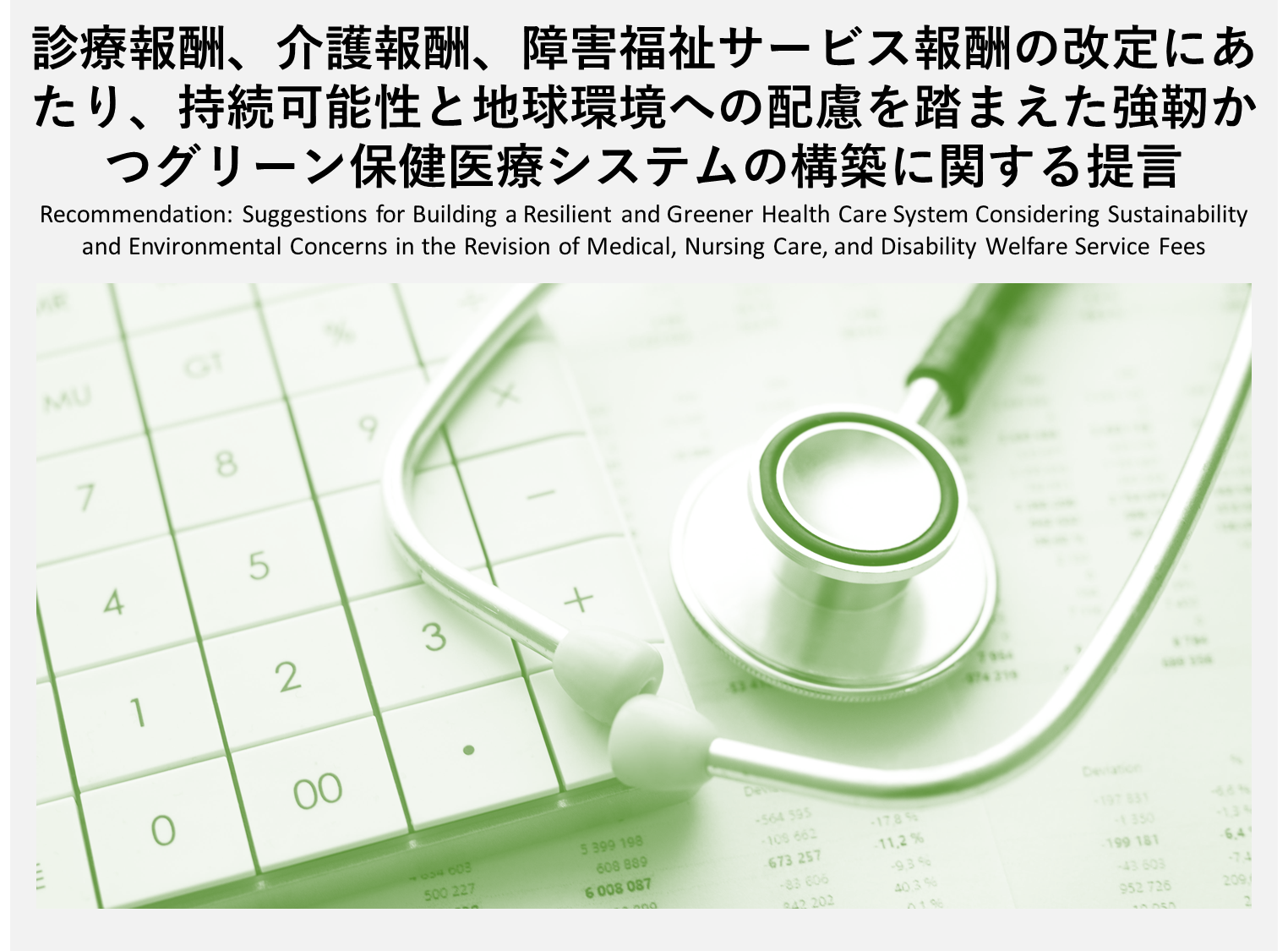
Policy Recommendations
Suggestions for Building a Resilient and Greener Health Care System Considering Sustainability and Environmental Concerns in the Revision of Medical, Nursing Care, and Disability Welfare Service Fees
Discussions are currently underway for the simultaneous revision of fees for health care, long-term care, and welfare services for persons with disabilities from April to June 2024. We recommend the following four points from a planetary health perspective.
Recommendation 1: Revise and increase basic hospitalization premiums and other surcharges to support the introduction of renewable energy
Recommendation 2: Incentivize the green procurement of medical supplies and materials
Recommendation 3: Expand the Functional Enhancement Premium to include new reimbursements for ascertaining and evaluating home living environments
Recommendation 4: Expand long-term care service fee schedule premiums to support enhancements to home living environments (for heat stroke prevention, etc.)
2023.10.24
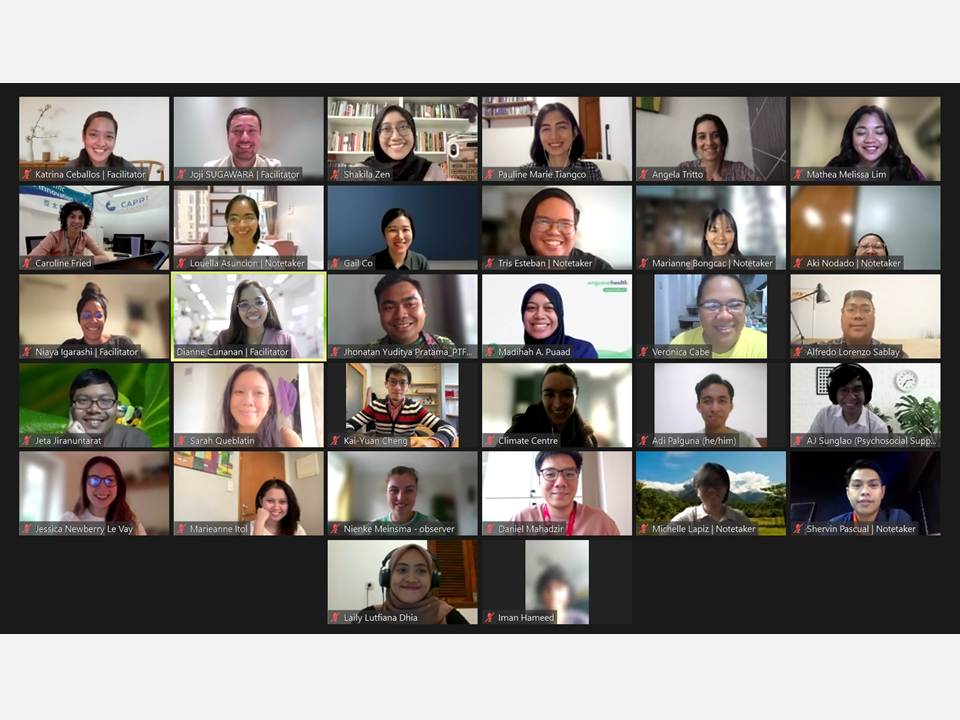
The 2nd Dialogue Session of Connecting Climate Minds
The East and Southeast Asia regional community convenors of Connecting Climate Minds have completed the second regional dialogue. Mr. Joji Sugawara, Vice President and Ms. Niaya Harper Igarashi, Program Specialist HGPI, participated as a regional co-convenor for the second time to facilitate group discussions..
2023.11.22
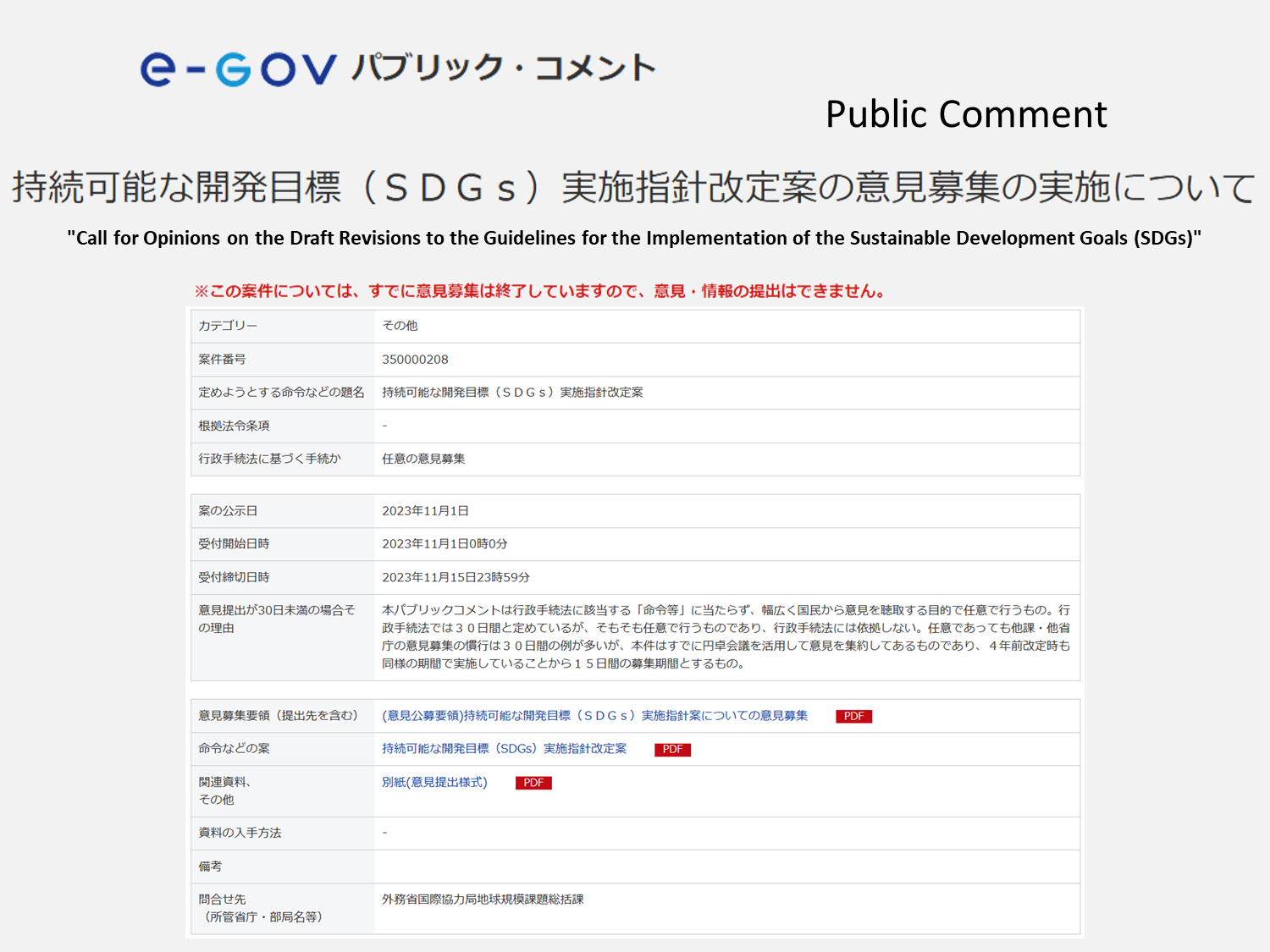
Public Comment Submission
Ministry of Foreign Affairs “Call for Opinions on the Draft Revisions to the Guidelines for the Implementation of the Sustainable Development Goals (SDGs)
The public comment includes the following perspectives
- The ‘new capitalism’ aims to create a ‘virtuous circle of growth and distribution’. This approach not only addresses social issues but also transforms efforts to tackle planetary health issues such as climate change, environmental pollution, and loss of biodiversity into engines of growth. This creates a mutually beneficial cycle of broad-based growth and appropriate distribution, which aligns with the achievement of the SDGs.
- It is expected to go beyond the original achievement of individual targets in terms of raising awareness of the trade-offs that arise in the achievement of the SDGs and methods known as co-benefits.
- Efforts to achieve the SDGs in local areas will be strongly encouraged through the Regional Development SDGs, the Environmental Future City concept, and the Regional Cooperation SDG Model Project. These initiatives can be re-evaluated through the newly established concept of planetary health. The government should also consider actively promoting the concept of planetary health both domestically and internationally.
- In particular, in the field of health care, in order to develop the concept of Universal Health Coverage (UHC) that the Japanese government has been promoting domestically and internationally, and to accelerate the global trend, we will consider participation in the Alliance for Transformative Action on Climate and Health (ATACH: Alliance for Transformative Action on Climate and Health), and aim to realize Greener UHC.
- The paper proposes incorporating a planetary health approach that integrates the conservation of the local environment and the health of the population. This could be achieved, for example, by greening the community and promoting sustainable local food systems.
Sign and Join
2023.10.16
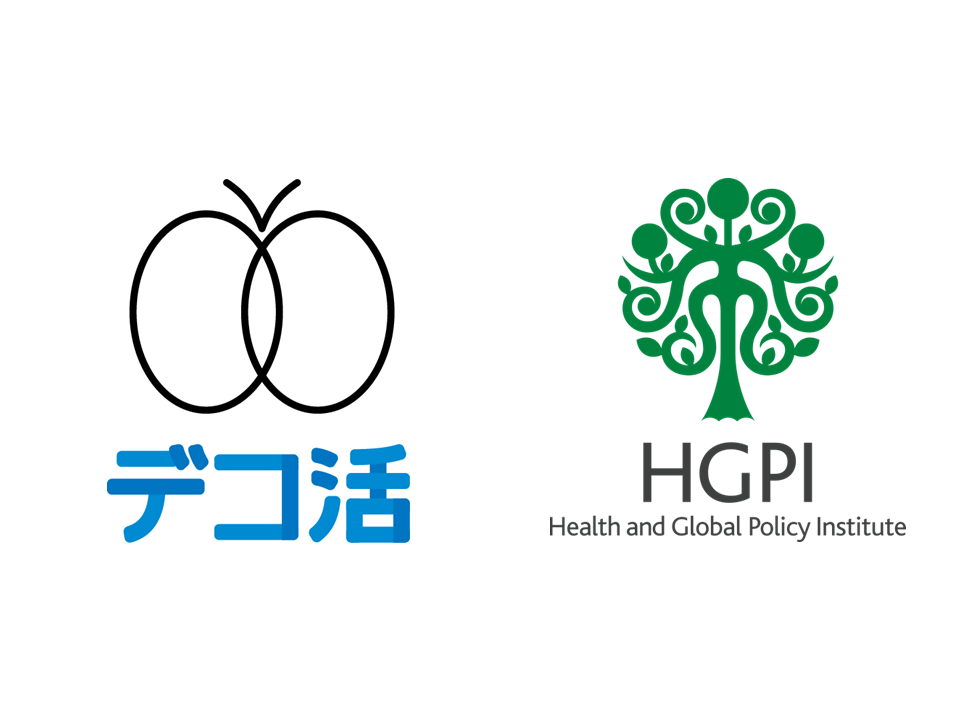
Declare the Ministry of the Environment-led ‘Deco-Katsu Declaration’ and Participation in the ‘Deco-Katsu’ Supporters
HGPI Planetary Health Project team released the ‘Deco-Katsu Declaration’ and participation in the ‘Deco-Katsu’ Supporters.
2023.11.01
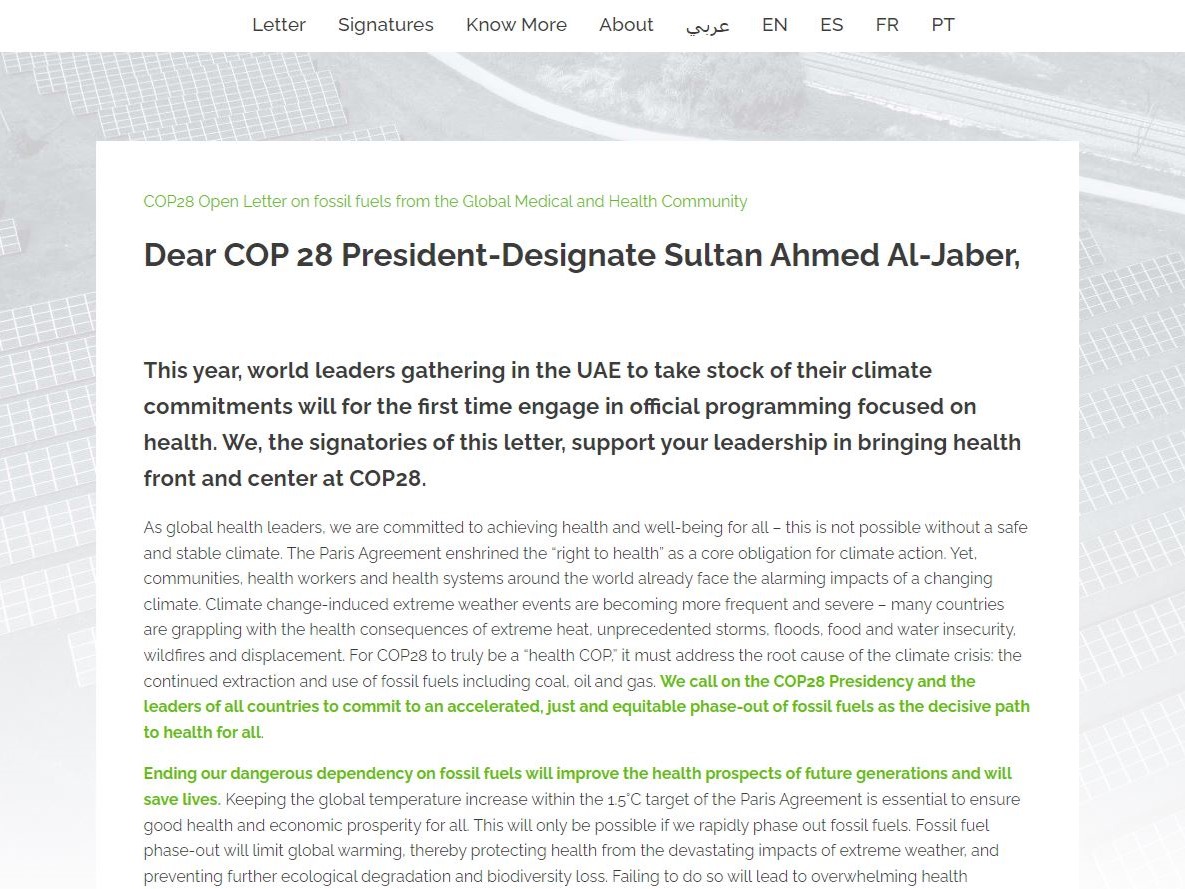
Call for “Global Health and Medical Community Unite To Demand End Fossil Fuel Dependency at COP28”
This letter was coordinated by Health Care Without Harm and Global Climate and Health Alliance on behalf of the climate and health community. As signatories of this letter, we, including HGPI, endorse the efforts of countries to prioritize health at COP28.
2023.11.30
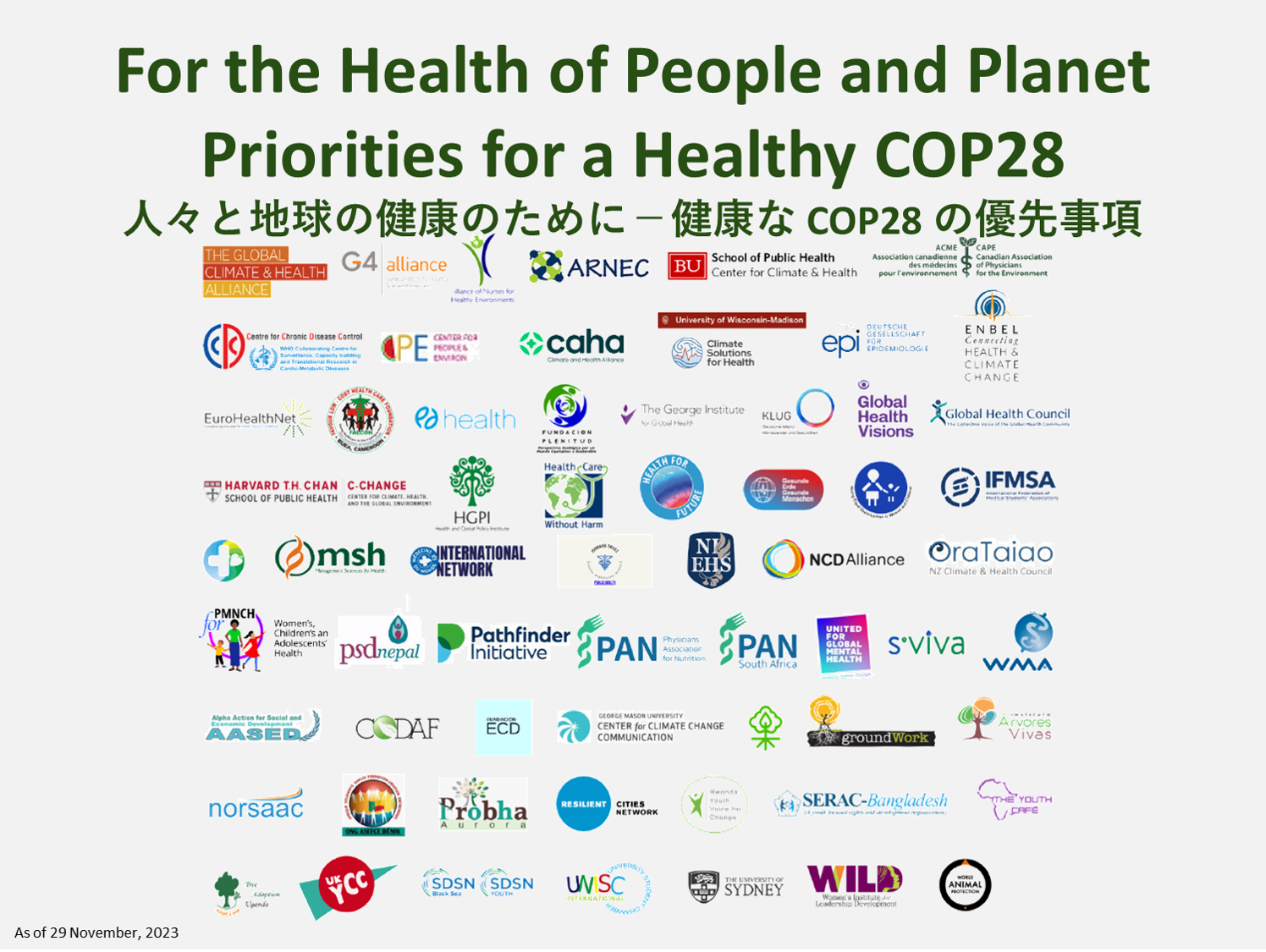
For the Health of People and Planet: Priorities for a Healthy COP28
This document urges ambitious decision-making and action across negotiations to protect and promote health. HGPI has prepared a Japanese translation of this document.
2023.12.12
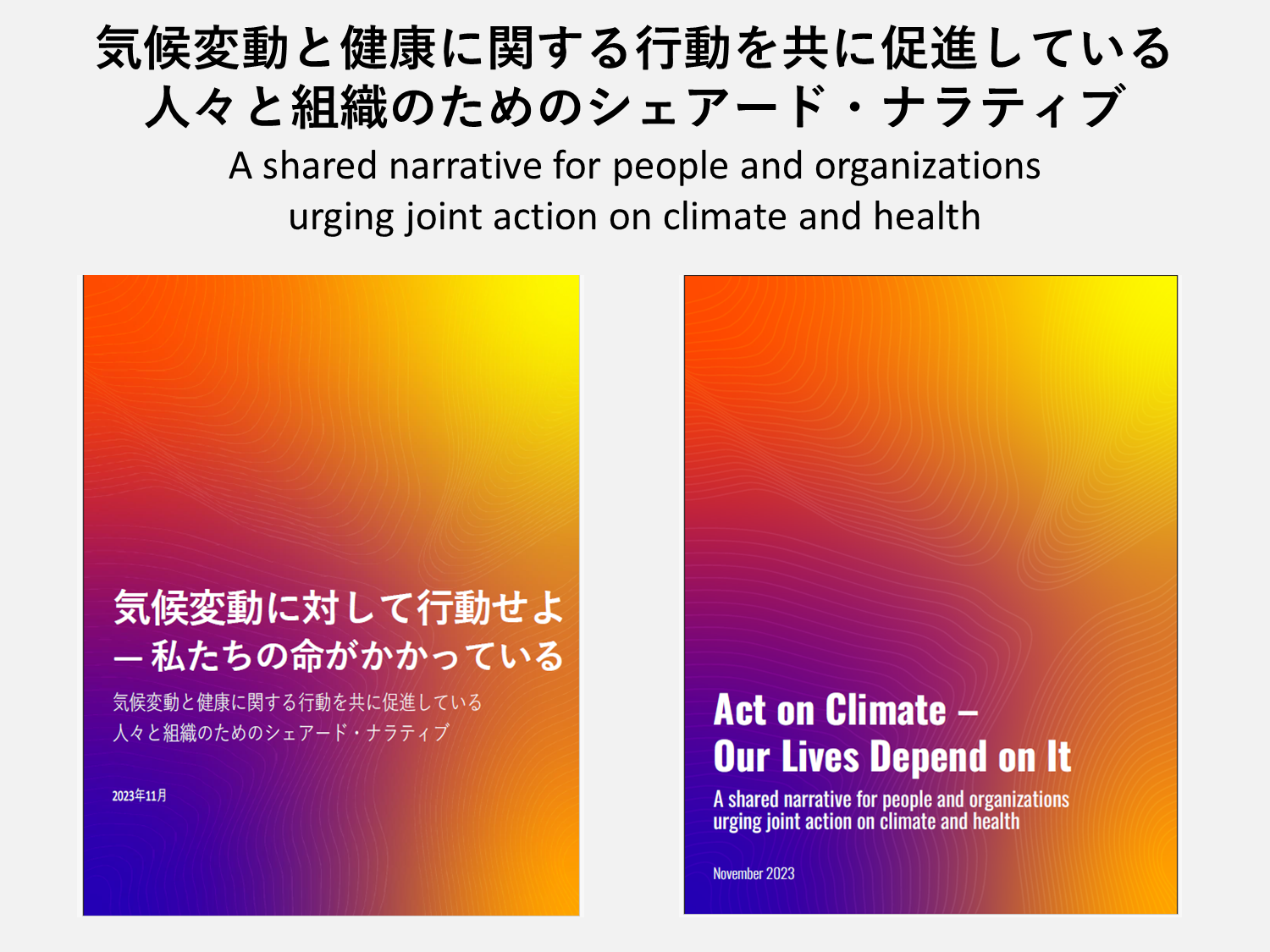
A Shared Narrative for People and Organizations Urging Joint Action on Climate and Health
HGPI Planetary Health Team endorsed and supported on the “Act on Climate – Our Lives Depend on It: A Shared Narrative for People and Organizations Urging Joint Action on Climate and Health,” compiled in November 2023 by the Climate x Health Initiative. HGPI has prepared a Japanese translation of this document.
Child Health/Mental Health
2023.10.24
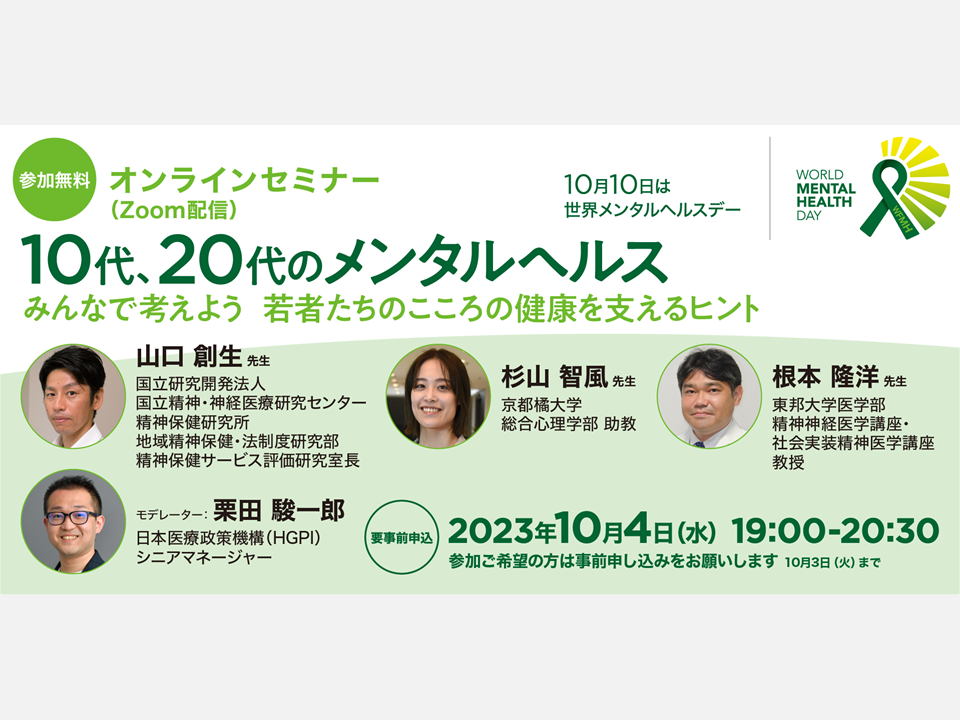
An Online Seminar for World Mental Health Day 2023
Mental Health for People in Their Teens and Twenties: Putting Our Heads Together to Think of Hints for Supporting Mental Health for Young People
Specialists in mental health and education discussed mental health for young people in their teens and twenties, covering topics ranging from the potential for education to eliminate stigma, methods of addressing stress, and providing early-stage care. They also shared other practical information that is useful for many people.
Dementia Policy
2023.10.24
The 13th Meeting of the Comparative Research Group on Local Regulations for Dementia
Based on the Dementia Basic Act for an Inclusive Society (or, the Dementia Basic Act) that was enacted on June 14, 2023, the meeting discussed prospects for local regulations for dementia and the future direction of the comparative research group. The Dementia Basic Act obligates prefectural and municipal governments to endeavor to create plans for the promotion of dementia policies, and during this discussion, the meeting exchanged various opinions on prospects for those plans.
2023.12.12
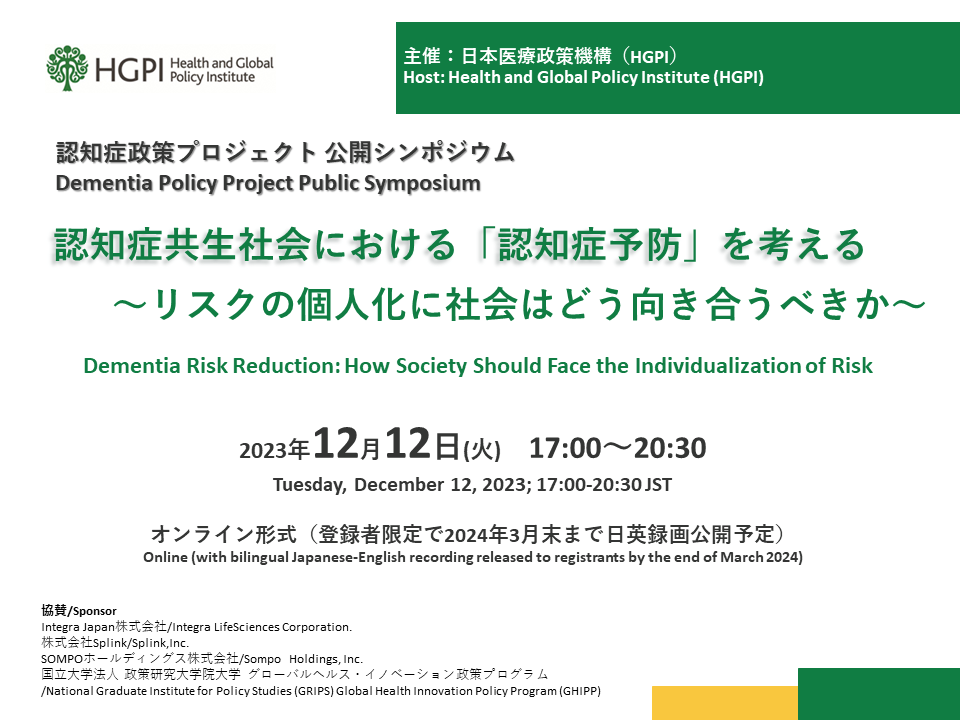
Online Public Symposium
Dementia Risk Reduction: How Society Should Face the Individualization of Risk
The symposium introduced the latest studies and initiatives for dementia risk, including examples from overseas, as well as shared methods of approaching risks with society from the perspectives of industry, government, academia, and civil society. We also considered how to best develop public-private partnerships and utilize private sector solutions. Finally, from the perspective of dementia, we deepened discussions on how to best structure financial resources and the burdens associated with measures for prevention and health promotion.
Participants (titles omitted)
Hayato Suzuki (Member, House of Representatives / Executive Director, Parliamentary Association for Promoting Dementia Policies for an Inclusive Society)
Shingo Segawa (Project coordinator and Researcher, Department of Medical Ethics and History of Medicine, University Medical Center Göttingen)
Hidenori Arai (President, National Center for Geriatrics and Gerontology)
Katsunori Kondo (Professor, Center for Preventive Medicinal Science, Chiba University)
Naoki Tokumoto (Executive Vice President, Splink, Inc.)
Taro Senba (Director, Dementia Project Promotion Office, SOMPO Holdings, Inc.)
Shibata Takanori (Chief Senior Research Scientist, Human Informatics and Interaction Research Institute, National Institute of Advanced Industrial Science and Technology)
Hidetaka Ohta (Professor and Director, Advanced Research Center for Geriatric and Gerontology, Akita University)
Madoka Nakajima (Associate Professor, Department of Neurosurgery, Juntendo University)
Soichiro Kosuga (Journalist, Specified Nonprofit Corporation, Citizen Sector Yokohama)
Kenji Shuto (Vice Governor, Kanagawa Prefecture)
Special Breakfast Meeting
2023.10.23
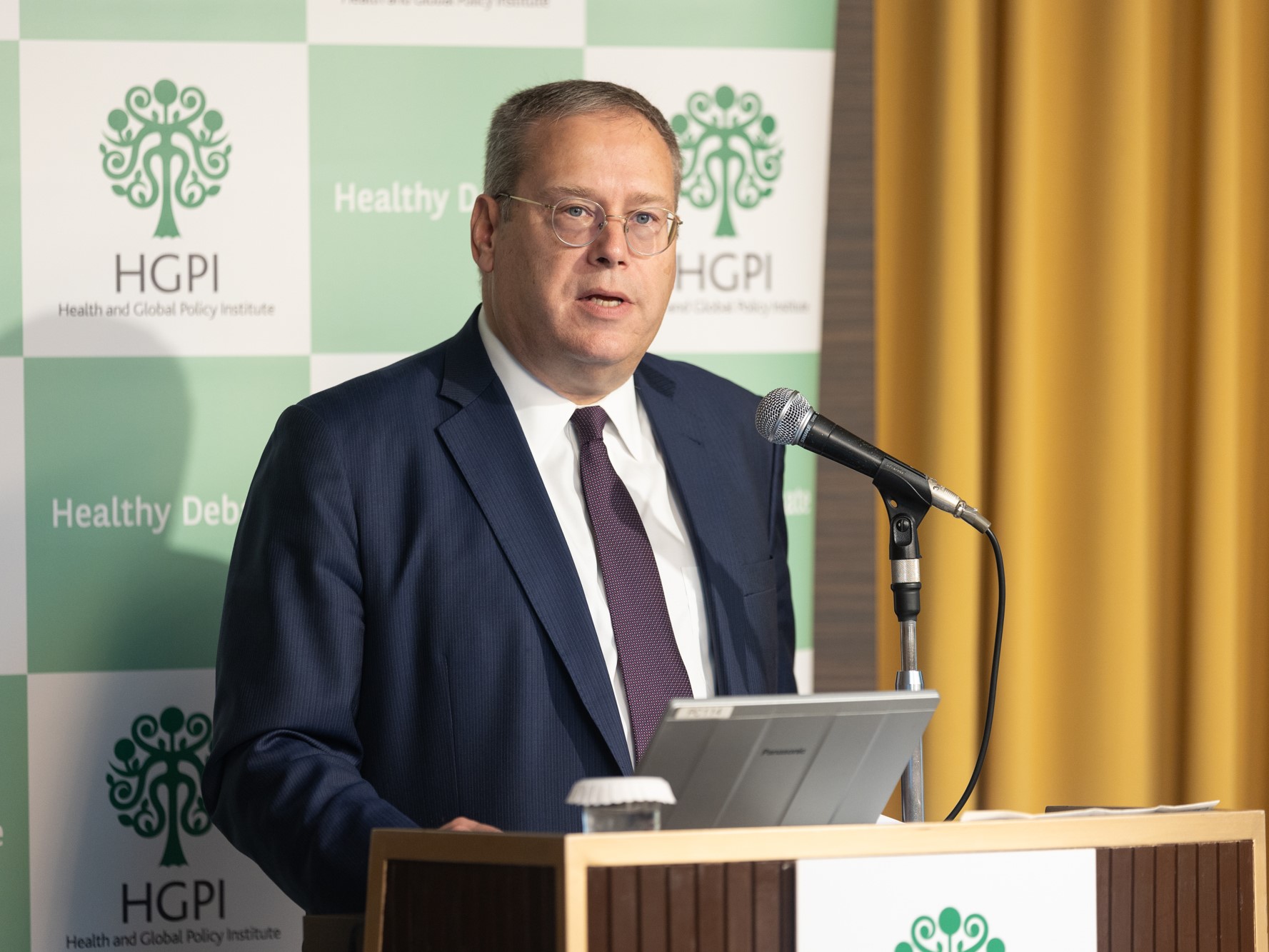
The 52nd Special Breakfast Meeting
US-China Competition and Healthcare Industry: New Frontier of Economic Security
We had the honor of hosting Ambassador Mr. Kurt Tong (Managing Director, The Asia Group). Based on his experience as a career diplomat and senior foreign affairs officer with the US Department of State for over 30 years and his current role as Managing Director of The Asia Group, Mr. Tong spoke about the intricate geopolitical dynamics between the US, China, and Japan at the intersection of regional security, health care, and economics.
Diet Member Briefing
2023.12.05
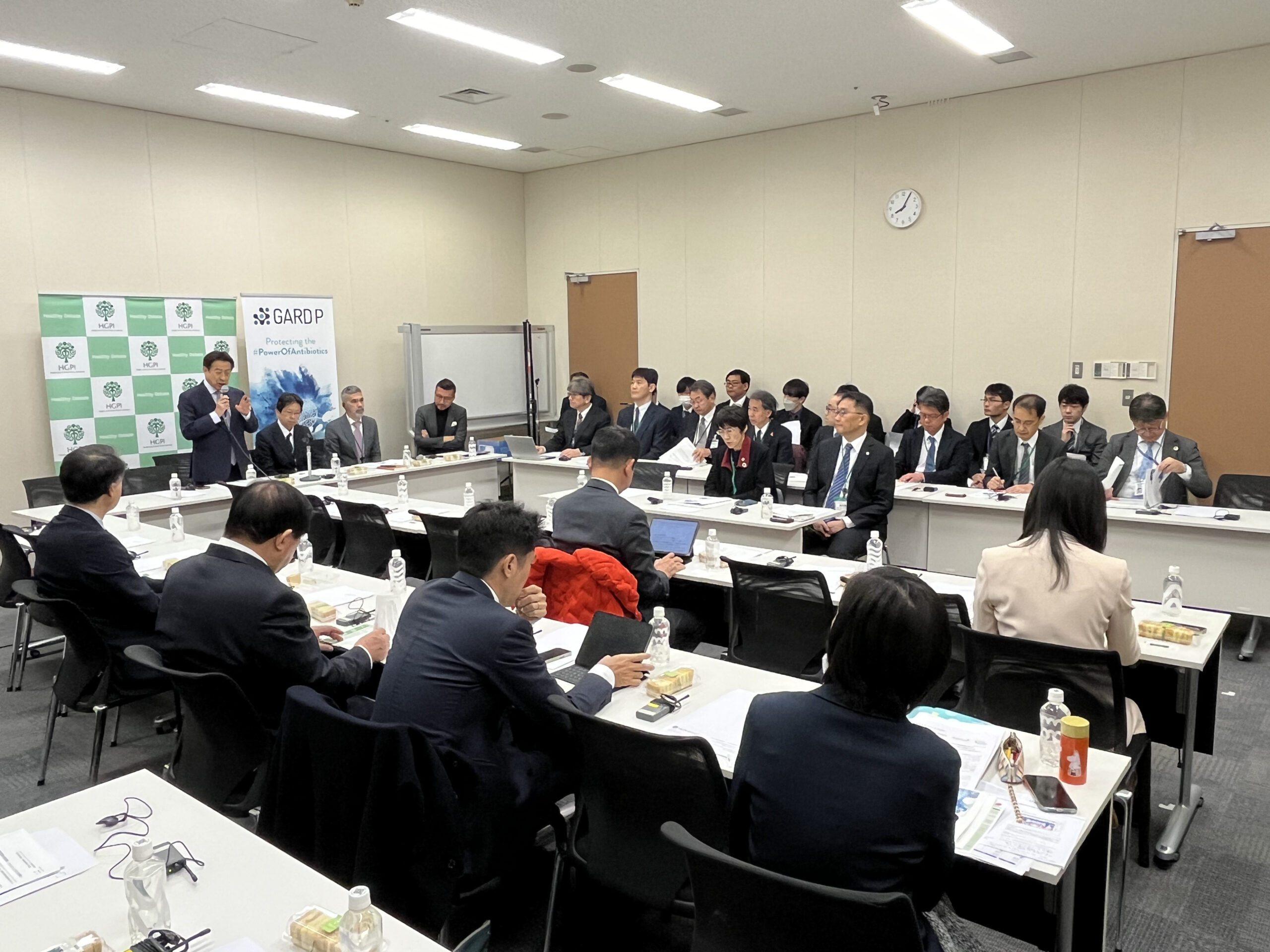
Study Session for Non-partisan Diet Members
Urgent Topics in Antimicrobial Resistance: Understanding the Threat of a Silent Pandemic
The study session featured lectures from Dr. Norio Ohmagari (Director, AMR Clinical Reference Center, National Center for Global Health and Medicine (NCGM)) and Mr. Yann Ferrisse (Director, Business Development & Partner Engagement, GARDP (Global Antibiotic R&D Partnership)). GARDP is a non-profit organization that was created by the WHO in 2016 to drive a global response to AMR through public and private partnerships for researching and developing new drugs to meet public health needs. They explained the urgent nature of AMR as well as the latest developments in Japan and around the world., A session was co-hosted by HGPI and the Global Leaders Group on Antimicrobial Resistance, which was established by the World Health Organization (WHO) and its partners.
2023.12.12
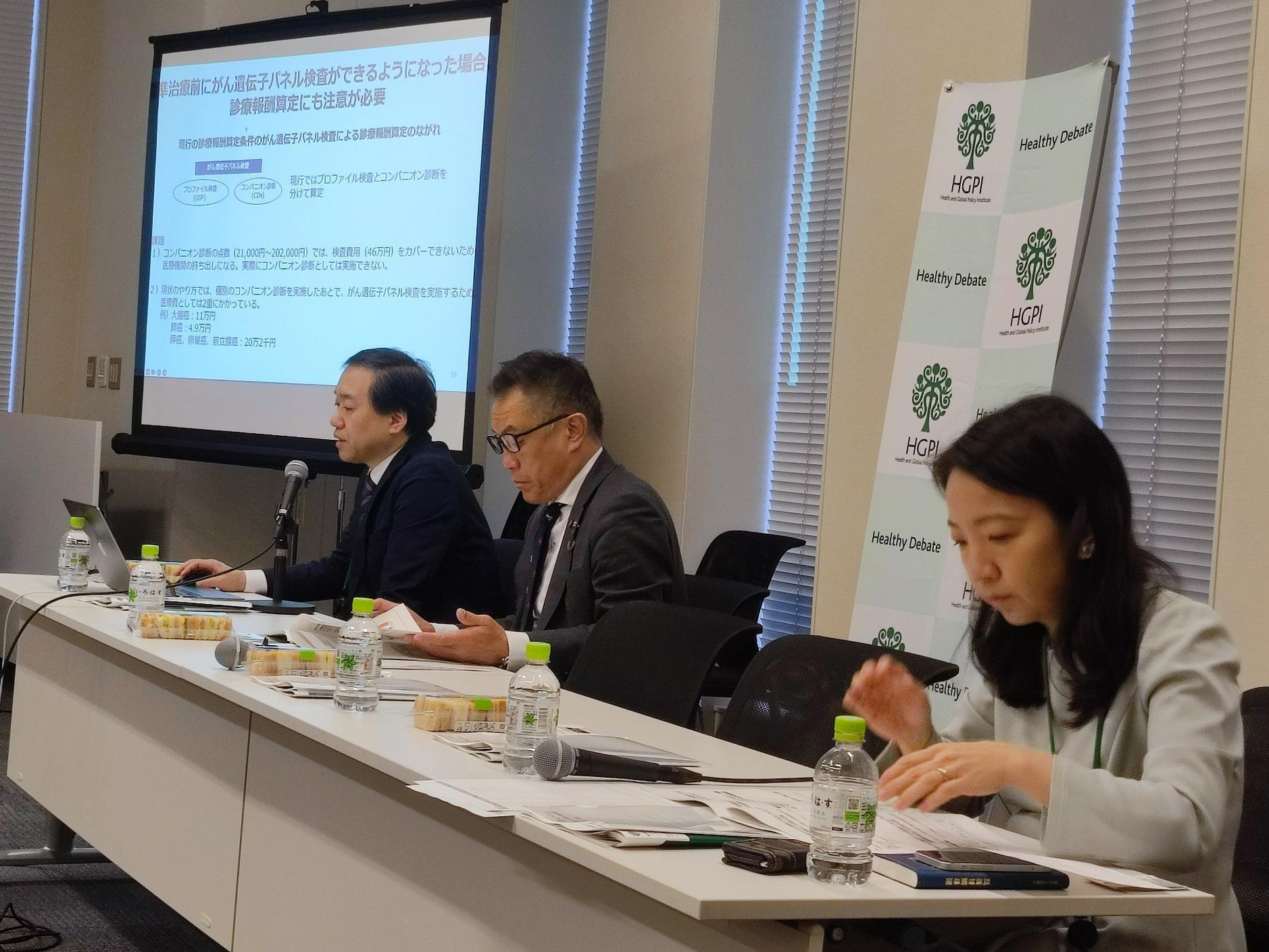
Study Session for Non-partisan Diet Members
Challenges and Prospects for Improving Patient Access to Genomic Cancer Medicine
Dr. Manabu Muto, Professor, Department of Therapeutic Oncology, Graduate School of Medicine, Kyoto University, gave a lecture on policy issues for improving patient access to Genomic Cancer Medicine. A study session was held under the auspices of the Japan Federation of Cancer Patient Groups.
HGPI Seminar
2023.10.10
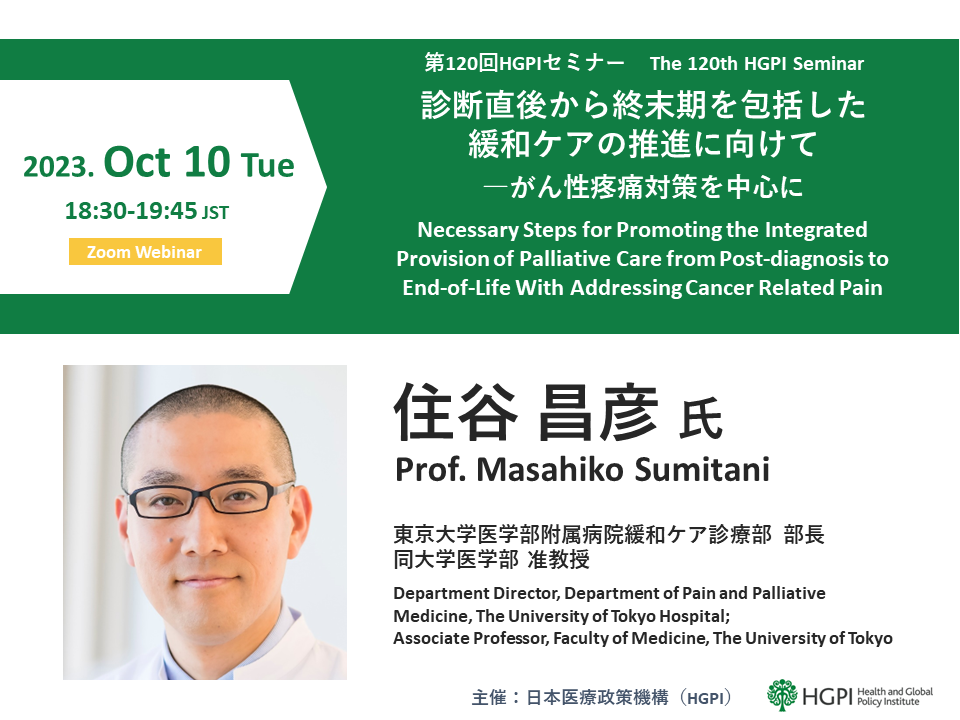
The 120th HGPI Seminar
Necessary Steps for Promoting the Integrated Provision of Palliative Care from Post-diagnosis to End-of-Life With Addressing Cancer Related Pain
We hosted Professor Masahiko Sumitani, Director of the Department of Pain and Palliative Medicine at the University of Tokyo Hospital, who gave a lecture on the growing recognition of the classifications of chronic cancer pain and palliative care and the necessary steps for advancing comprehensive palliative care that encompasses the early post-diagnosis, treatment, and end of life phases as well as care for cancer survivors.
2023.10.30
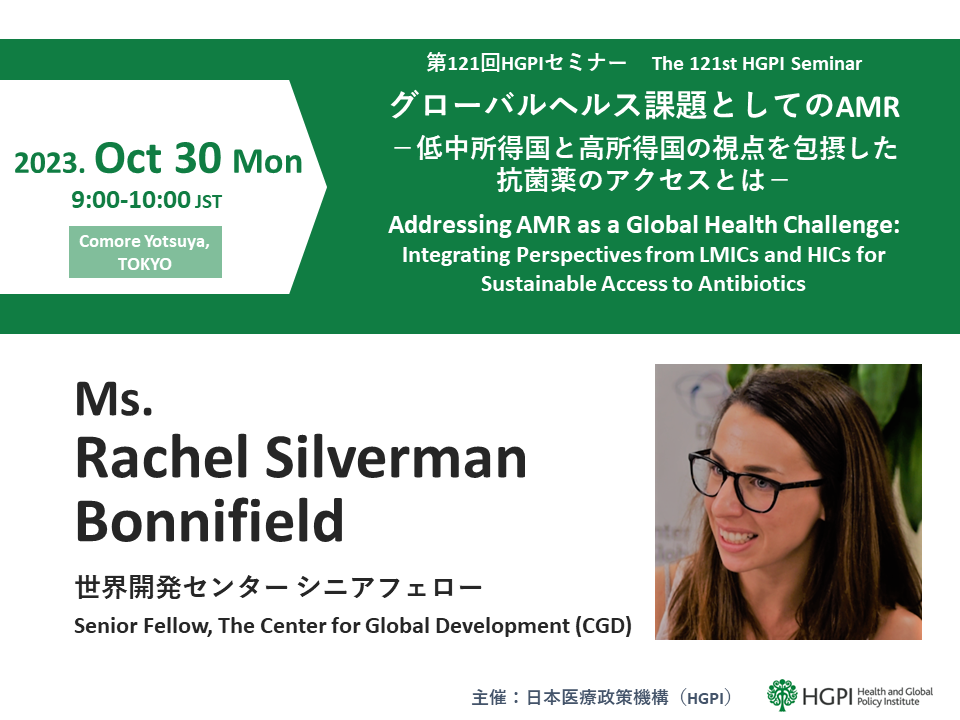
The 121st HGPI Seminar
Addressing AMR as a Global Health Challenge:
Integrating Perspectives from LMICs and HICs for Sustainable Access to Antibiotics
We hosted Ms. Rachel Silverman Bonnifield, a senior fellow at the US think tank, Center for Global Development. In this seminar Ms. Bonnifield discussed antimicrobial resistance (AMR) as a global health crisis. She highlighted the need for collaboration and agreement across geographical, economic, industrial, and sectoral borders to address the ongoing burden of antibiotic-treatable disease and ensure that all people, including those in low- and middle-income countries (LMICs), can access lifesaving antibiotics when needed both now and in the future.
2023.12.19
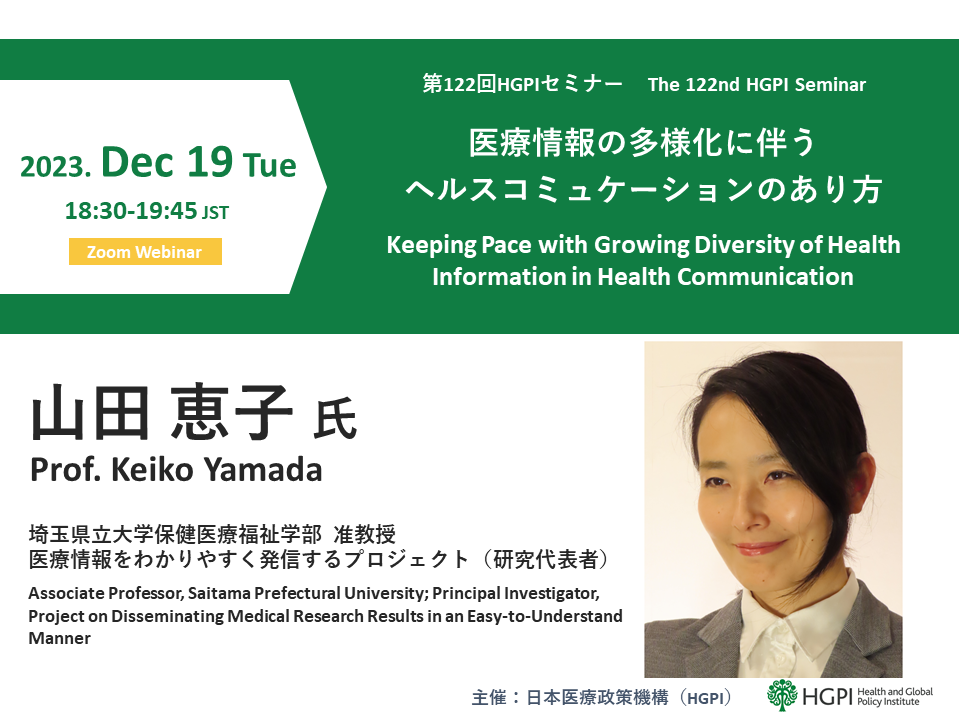
The 122nd HGPI Seminar
Keeping Pace with Growing Diversity of Health Information in Health Communication
We hosted Professor Keiko Yamada, a representative of a project that is working to disseminate health information in an easy-to-understand manner. While focusing on the world of healthcare where “Just trying something to see if it works” is unacceptable as well as on the special nature of health information, which can have a direct impact on people’s health, Professor Yamada examined topics like the ideal form of and challenges facing health communication as well as desirable measures that can help people obtain correct information outside of health institutions so they can continuously grasp and manage their own health information.
2023.10.27
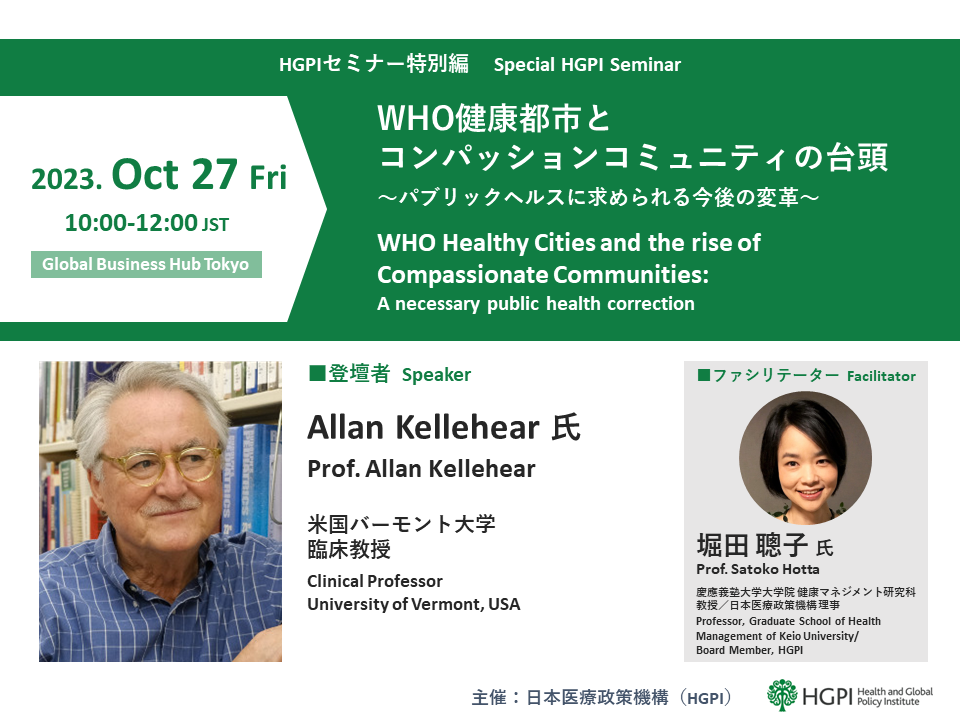
HGPI Special Seminar
WHO Healthy Cities and the Rise of Compassionate Communities: A necessary public health correction
In collaboration with the General Incorporated Foundation Orange Cross, we invited Prof. Allan Kellehear, a leading expert on compassionate communities, to deliver a lecture. First, the international policy background that led to the emergence of compassionate communities were explained. The presentation then outline the key policy and practice strategies adopted by compassionate communities/cities, highlighted emerging trends in health and social care and the evolution of the international profession, and discussed the correction required in public health.
Health Policy Academy
HGPI has held the 12th session of Health Policy Academy (HPA).
2023.10.13
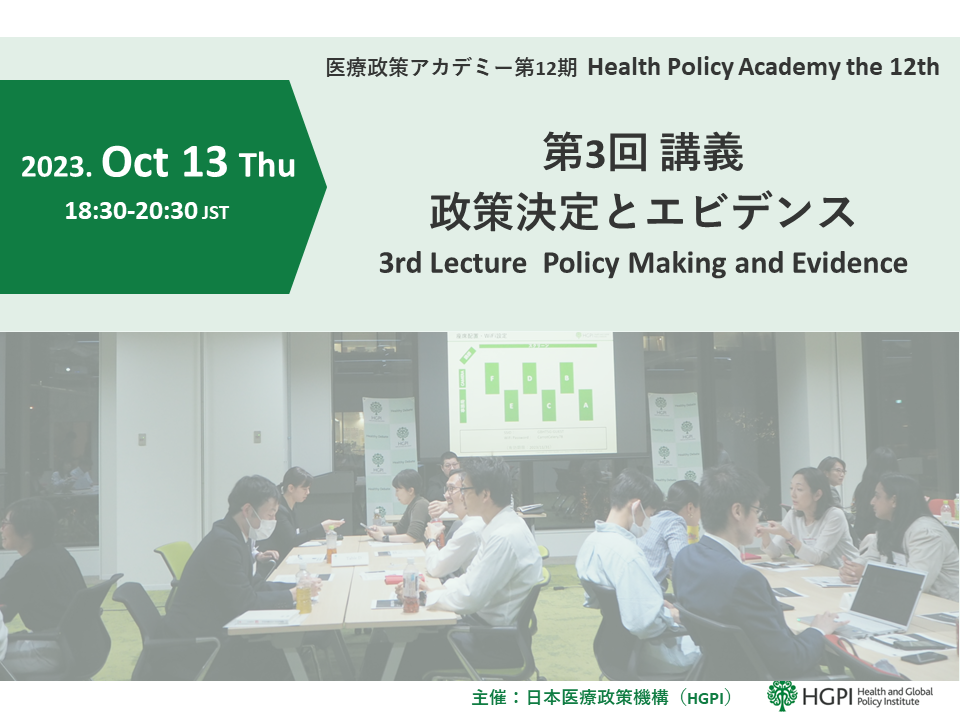
Lecture 3
Policy Making and Evidence
Dr. Kazuya Sugitani (Senior Lecturer, Faculty of Policy Studies, Iwate Prefectural University) provided a lecture that focused on the features and issues of Evidence-Based Policy Making (EBPM) in Japan, analysis of policy and relationship between policy and value.
2023.11.09
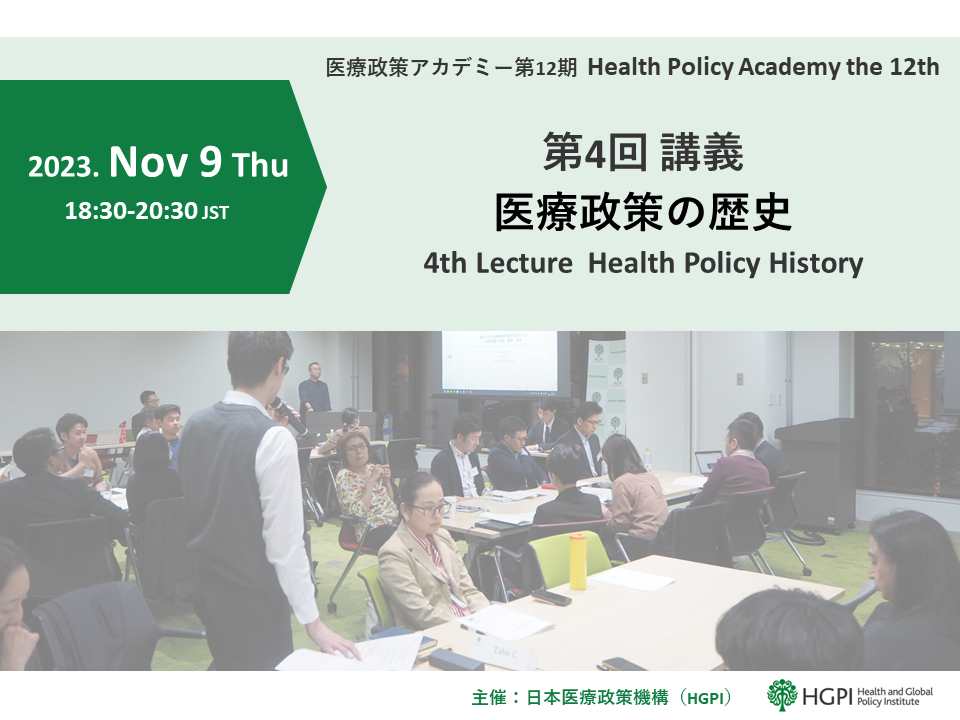
Lecture 4
Health Policy History
Prof. Soichiro Mitani (Associate Professor, Faculty of Law Department of Law, Faculty of Law, Konan university) provided a lecture that focused on how policy knowledge, such as reform proposals within the history of health policy, has been inherited and passed down over time.
2023.12.14
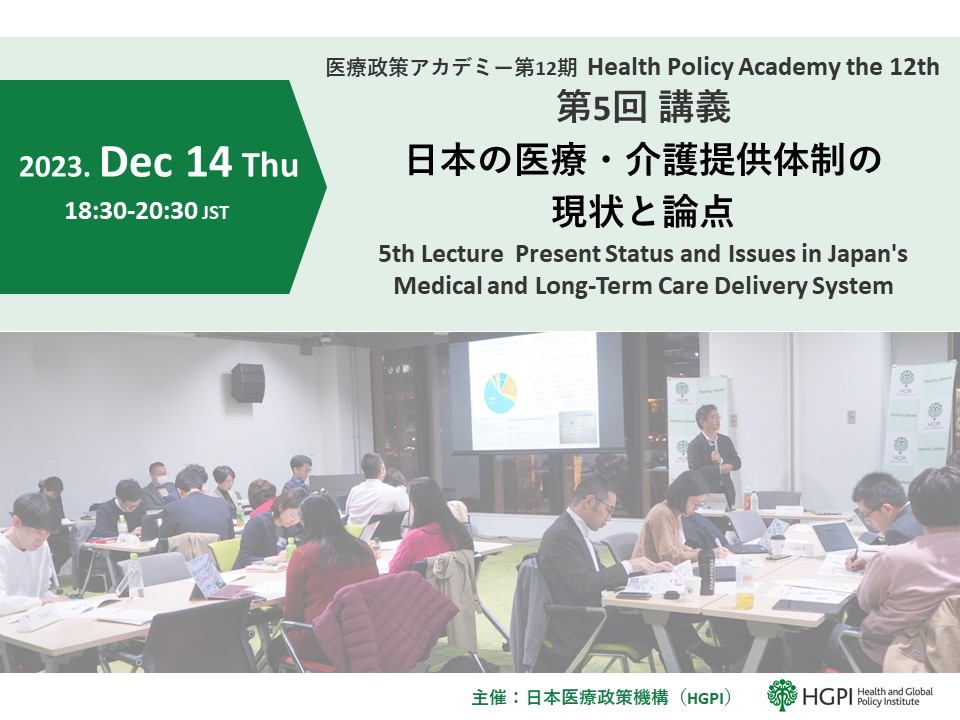
Lecture 5
Present Status and Issues in Japan’s Medical and Long-Term Care Delivery System
Mr. Takashi Mihara (Senior Researcher at the Healthcare Research Center, NLI Research Institute) provided a lecture that focused on the overview and background of the regional healthcare vision with the theme of “medical care that supports people’s lives”. He also discussed the significance of collaboration in searching for information.
Lectures and Media Coverage
HGPI’s projects have been covered by various media outlets both inside and outside of Japan.
2023.10.01
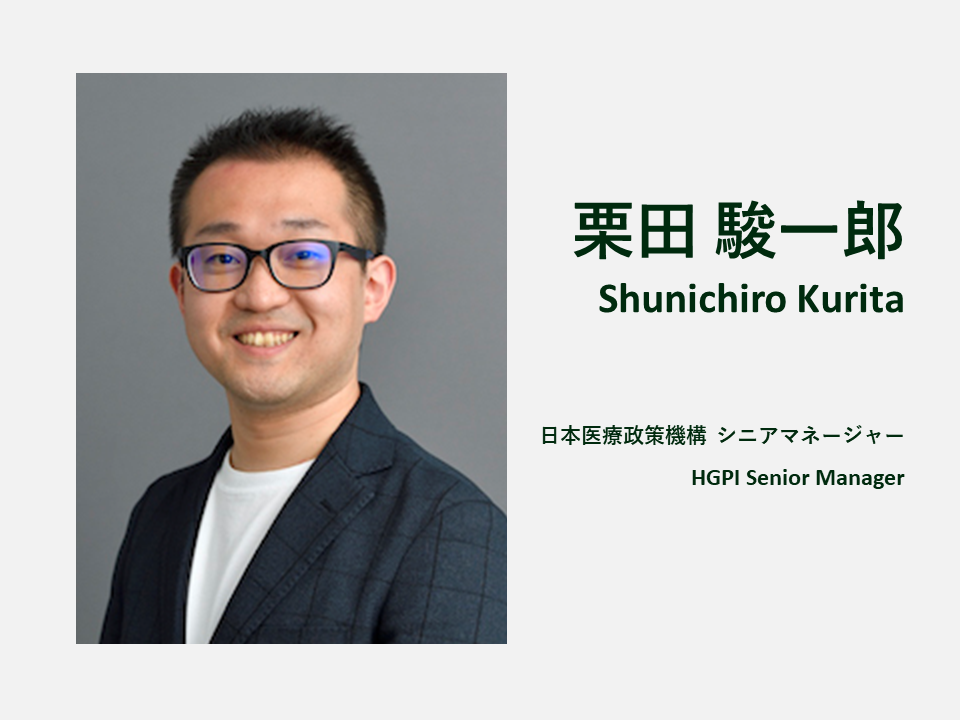
Tokyo FM “School of SDGs Mirai Code”
Senior Manager Mr. Shunichiro Kurita appeared on Tokyo FM’s “School of SDGs Mirai Code, in response to the enactment of the Dementia Basic Law, the content of the law and the future direction of our society were discussed in the program.
2023.10.02
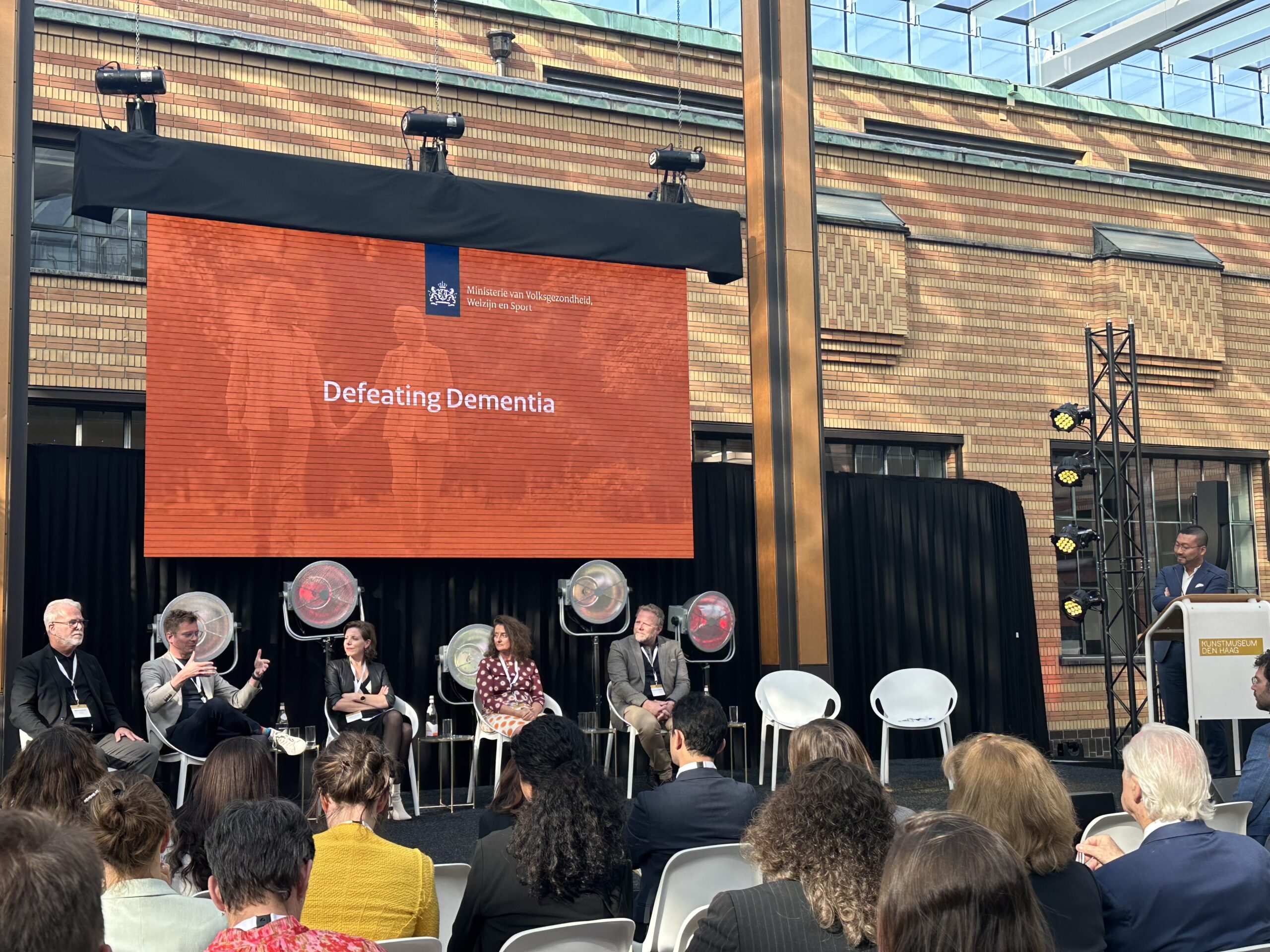
Netherlands Government Highlevel Meeting “Defeating Dementia Conference”
CEO and Board Member Mr. Ryoji Noritake presented at the Defeating Dementia Conference, a high-level meeting on dementia, co-hosted by the Government of the Netherlands and the World Dementia Council (WDC), held in The Hague, the Netherlands.
2023.10.16-18
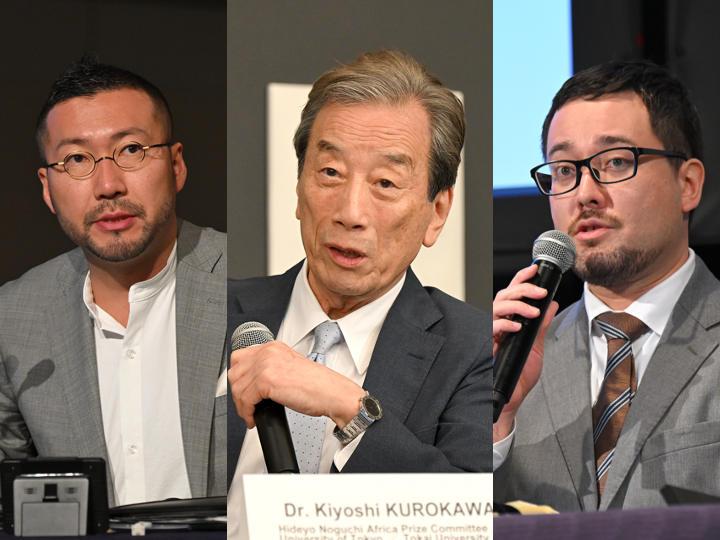
The 10th NIKKEI FT Communicable Diseases Conference “Towards a Society Resistance to Communicable Deseases
Chairman Dr. Kiyoshi Kurokawa, CEO and Board Member Mr. Ryoji Noritake, and Vice President Mr. Joji Sugawara spoke at various programs throughout each day of the 10th NIKKEI FT Communicable Diseases Conference, organized by Nikkei Inc. and co-sponsored by Financial Times.
2023.11.24-26
Joint Congress on Global Health 2023
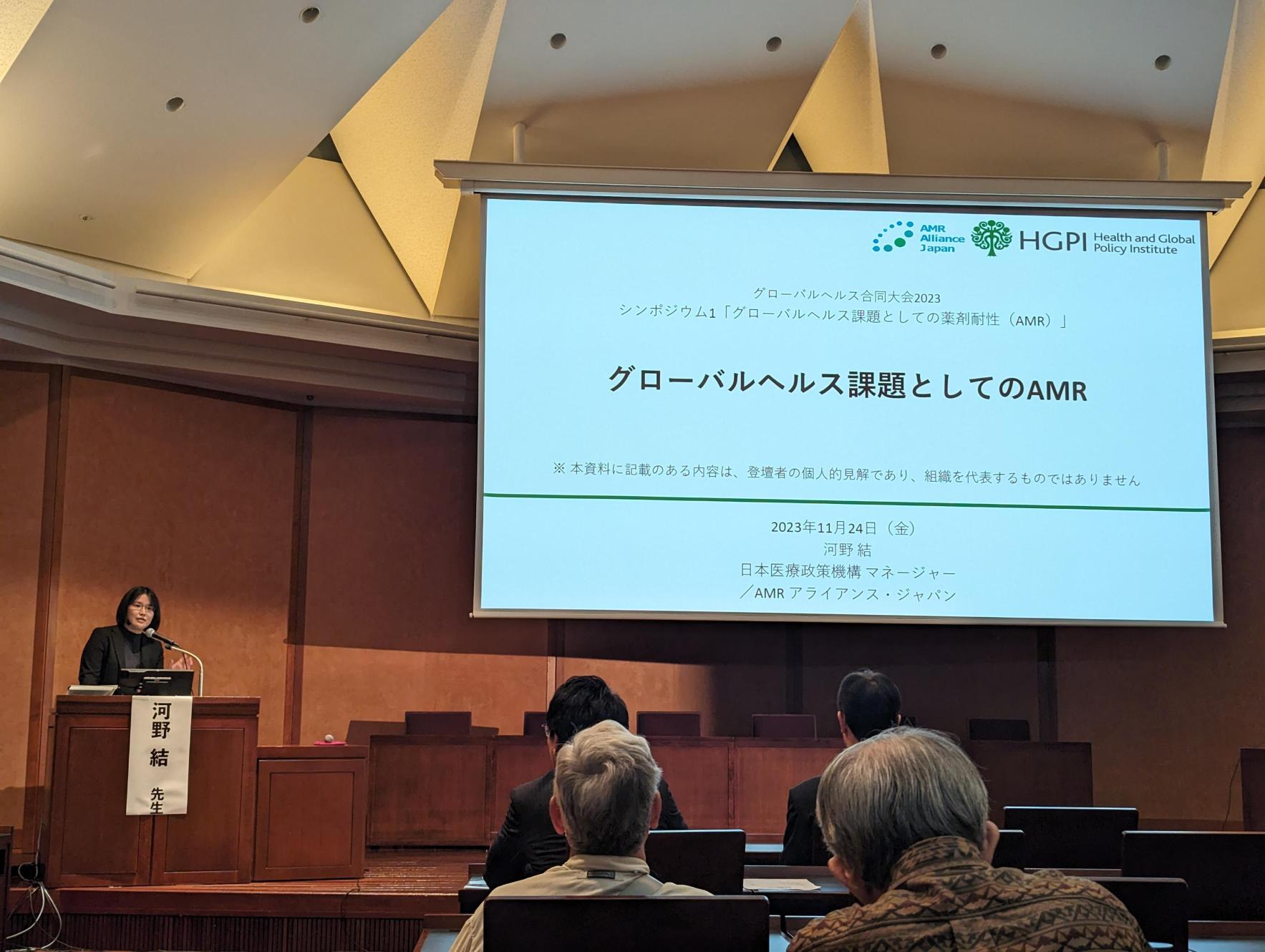
AMR as a Global Health Challenge
Presented by Manager Ms. Yui Kohno.
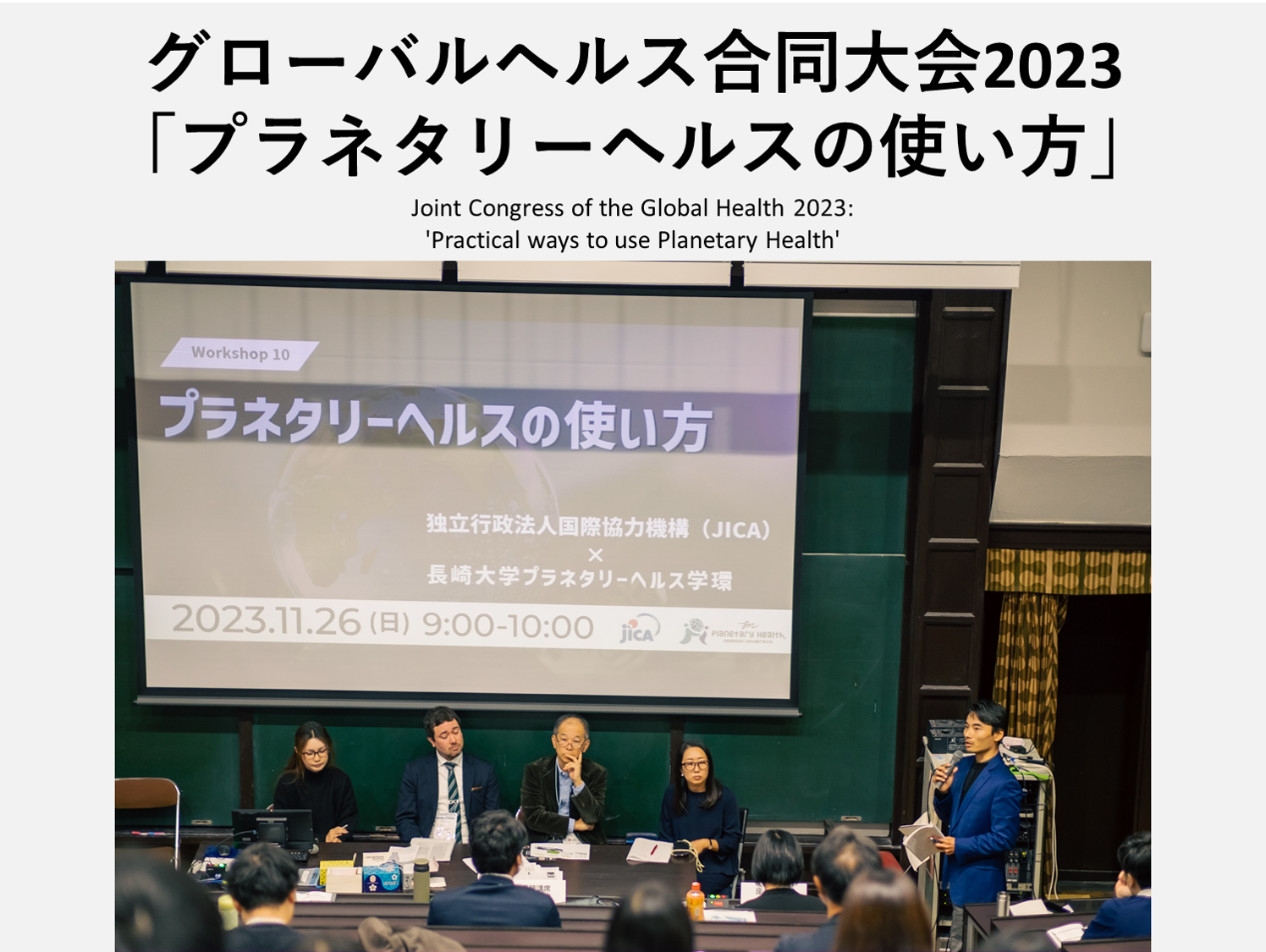
Practical ways to use Planetary Health
Presented by Vice President Mr. Joji Sugawara.
Media Coverage
|
Preventive Medicine Reports |
|
Health Systems & Reform |
|
Mainichi Newspaper, KYODO NEWS, Jiji Medical |
Advocacy Activities to Encourage the Adoption of the Recommendations in Our Policy Proposals

HGPI composes and publishes reports and policy proposals for each of its projects. HGPI also makes efforts to encourage the implementation of the recommendations contained in those publications through advocacy activities targeting the government and Diet. Those efforts include providing explanations on the content of each report and proposal to representatives from relevant departments with the local and national government or to Diet members and local assembly members on an individual basis. In addition to cooperating closely with parties relevant to each project from the local and national government, HGPI also functions as a hub that creates links within the community of experts in each field when creating content for Diet member study sessions or when drafting bills. We engage in these cooperative efforts with a shared intent of encouraging the implementation of concrete policies based on our recommendations. In the past, recommendations included in HGPI’s reports and policy proposals have been reflected in policies after having been cited in presentations made by various groups within the government, including nonpartisan Diet member groups and project teams, or in proposals composed by those groups.
Providing Professional Expertise
Serving on Government Committees and Global Organizations
Senior members of HGPI have held various titles on government committees and in global health societies. Some of those titles are listed below.
- Kiyoshi Kurokawa: Member, World Dementia Council; Healthcare Policy Advisor, Cabinet Secretariat; Chairman, Council on the Future of Tokyo in a Super-Aged Society; Chairman, Cabinet Office’s AI Advisory Board, Special Advisors to the Cabinet, Chairperson, Hideyo Noguchi Africa Prize Committee
- Ryoji Noritake: Committee Member, Council on the Future of Tokyo in a Super-Aged Society
- Kohei Onozaki: Health Policy Advisor, Ministry of Health, Labour and Welfare; Social Security Team, Administrative Reform Conference, Cabinet Secretariat
- Yusuke Tsugawa: Council Member, Advisory Council on Large-scale Demonstration Projects for Prevention and Health Promotion, Ministry of Health, Labour and Welfare, Member, Study Group on the Review of Guidelines for the Appropriate Implementation of Online Medical Care, Ministry of Health, Labour and Welfare
- Ryozo Nagai: Member, Ministry of Health, Labour, and Welfare Social Security Council; Provisional Member, Council for Science and Technology, Ministry of Education, Culture, Sports, Science and Technology; Member, Cabinet Office’s AI Advisory Board
- Satoko Hotta: Member, Caregiver Fee Subcommittee and Welfare Division, Social Security Council, Ministry of Health, Labour and Welfare; Expert Committee Member, Policy Evaluation Council, Ministry of Internal Affairs and Communications
- Shinsuke Muto:Information Policy Advisor, Ministry of Health, Labour and Welfare



